The Legendary (and Violent) 1974 British & Irish Lions Tour of South Africa
- March 25, 2020
- Ultimate Rugby
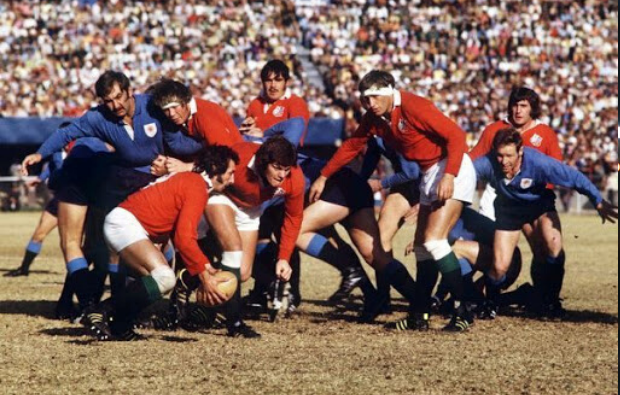
The 70s: a decade largely remembered for questionable hairstyles, economic uncertainty, social upheaval and the Bee Gees. In rugby terms, however, it was the stage of one of the most controversial sporting series in history; the 1974 Lions tour to South Africa.
Under the apartheid regime, South Africa had gradually cultivated a reputation for itself as an international pariah.
Many of the British public and their leaders were fundamentally opposed to the tour going ahead, though it did materialise, albeit under fiery circumstances.
The Lions were captained by the legendary Willie-John McBride and boasted other revered names among their ranks such as Gareth Edwards, JPR Williams, Phil Bennett, Ian McGeechan, Fergus Slattery and JJ Williams.
McBride was well aware of the daunting task ahead of the team – the Springboks had never lost a series on home soil before – and it was imperative to him that they were all on the same page when he sat his players down before they departed.

“I said, ‘I’m going to South Africa...I have one objective: to win the series...it’s nothing to do with politics, as far as I’m concerned, nothing. If anybody has any doubt about going on this tour, the door is open. Please leave now. Don’t come to me in a week, don’t come to me tomorrow, don’t come to me in three weeks, because you’re no use to this team if you have the slightest doubt and you’re certainly no use to me,’” McBride recalls, “Nobody moved. And I said, ‘Okay, we now are on the road.’”
The first significant game of the tour was against Eastern Province- then tough customers in the South African provincial scene – who were led by the Springbok captain, Hannes Marais.
With the tensions electric off the field, it was inevitable that violence would rear its head on it, and the Lions were prepared.
At the shout of McBride’s famous “99” call, the men in red swarmed with steely aggression and clenched fists, administering brutal beatings on any opposition player who dared antagonise one of their own. The Lions had made a statement, in no uncertain terms, that their days of being bullied by the burly Afrikaners were over and the spirit of the tour was forged.
Lions 28 – 14 Eastern Province.
McBride’s charges marched on to Newlands to take on giants Western Province one week before the first test at the same venue and emerged 17 – 8 victors, as yet unbeaten on the tour.
The Springboks took on their rivals at a wet and muddy Newlands on the 8 th of June and were defeated 12-3, the first Lions victory at that venue since 1938.
“It [the victory] gave everybody that tremendous feeling that we were dominant and we were believing in ourselves.” said McBride.

The road to the second test saw the Lions despatch the Southern Universities XV (26-4), Transvaal (23-15) and Rhodesia (42-6) before they took the field in Pretoria.
The team bus pulled up to Loftus Versveld with its occupants in full song – belting out the rousing lyrics of Flower Of Scotland and revelling in a spirit of confidence which manifested on the field of play.
“When we got off that bus and into the dressing room, we knew that something special was going to happen that day.” former Lions lock Gordon Brown recounts.
Brown was right, and the Lions were dominant, winning the second test 28-9 in front of a shocked crowd to go up 2-0 in the series.
The 13 th of July 1974 saw the sides clash in the vital third test, again, in Port Elizabeth.
The Springboks, now desperate for victory blasted out of the tunnel onto the field like green bullets from a gun, a tongue-lashing from the Minister of Sport in the dressing room still ringing in their ears. What transpired was the most brutal, violent game of the tour, “Fitting more for the boxing ring,” a commentator quipped. At the final whistle the players left the blood-stained pitch with the scoreboard reading 26-9 in the Lion’s favour and McBride’s men were forever etched in history.
The fourth and final test ended in a 13-13 draw, but the writing was already on the wall; that the Springboks had been out-played and out-fought, suffering their first ever home series defeat to a Lions team that would go down as one of the greatest in the tradition.
The Lions returned home unbeaten, having played 22 games, winning 21 and drawing 1, scarring the pride of the Springbok jersey.
As we look towards the tour of 2021, the mouth waters at the prospect of the now world champion South Africans taking on the best of Britain and Ireland in another clash of physicality and flair.

In this Article

Latest News

Never miss a try, transfer or tackle!
The Roar The Roar
- Rugby Homepage
- Rugby Video Hub
- Roar Rugby Podcast
- Super Rugby Fixtures
- Super Rugby Ladder
- Super Rugby Squads
- Super Rugby Tipping
- Wallabies Fixtures
- Wallabies Squad
- World Rankings

- Cricket Homepage
- Cricket Video Hub
- Australian Cricket Fixtures
- BBL Fixtures
- Domestic Cricket

- League Homepage
- League Video Hub
- NRL Fixtures
- NRL Transfer Centre
- State of Origin
- 2024 State of Origin Draw
- Origin Teams
- NRL Tipping
- NRL TV Guide

- AFL Homepage
- AFL Video Hub
- AFL Fixtures
- AFL Injury List
- AFLW Fixtures
- AFL Tipping
- AFL TV Guide
- AFL Live Stream

- Football Homepage
- Football Video Hub
- Matildas Fixtures
- English Premier League Fixtures
- Socceroos Fixtures
- A-League Fixtures
- FIFA World Rankings

- Motorsport Homepage
- Motorsport Video Hub
- Australian Grand Prix full schedule
- How to watch Australian Grand Prix
- All Sports A-Z
Content Collections
- Editor's picks
- Longform Articles
Captured a great grassroots sporting moment? We want to see it!
Write for The Roar
- Submit an Article or Video
- Improve your sports writing
- Roar Authors
- Common FAQs
- Editor's Picks
The Roar Community
- Latest Comments
- Roar Tipping
- Join our Newsletter
- Roar user ranks
- Privacy Policy
- Terms & Conditions
Follow The Roar
Lions versus springboks: the history of the british and irish lions in south africa.
Winner drawn every Friday at 11am. Promotion ends April 12th, 2024.
With the British and Irish Lions due to tour South Africa in June of this year, I thought it would be a good time to take a brief look into the history of Lions tours to South Africa.
The Lions and South African rugby have been inextricably linked since rugby first became a sport in South Africa. The Lions also tour New Zealand and Australia but here I will concentrate on their tours to South Africa.
The South Africa Rugby Board (later Union) was first formed in 1889 and it quickly set about sending out an invitation for a European team to tour their country. A team made up of players from England and Scotland had toured New Zealand in 1888 and it was thought that a similar tour would help popularise the game of rugby in South Africa. The invite was accepted and the tour was arranged to take place in 1891.
These proto-Lions (although not technically a British and Irish Lions squad these teams have been subsequently included in every official history of the Lions) were the first international side to play rugby matches in South Africa and the three-match Test series was the first Test series played by the Lions, and the first ever international rugby matches played by South Africa.
Although the Lions were not made up of the best players around at that time (the Lions always had difficulty in terms of selection due to many players declining the invitation to travel due to financial and family constraints), with only nine full caps among the 20 players selected, with two players winning further caps, they still proved too strong for the South African players, who in 20 games only scored a single point against the visitors. The Lions finished the tour with 20 wins from 20 games, including the three-Test series against South Africa. Amazingly, those 20 games were played over a time span of only 30 days!
The star for the Lions was giant centre Randolph Aston, who scored 30 tries on tour (although a try at the time was only worth one point). Before setting sail, tour captain Bill McGlagan was presented with a trophy by a shipping magnet. This trophy was to be presented to the team that achieved the best result against the Lions on tour. The shipping magnet was Sir Donald Currie and the trophy became known as the Currie Cup, which is competed for by the South African provinces every year. The 1891 winners of the Cup were Griqualand West, who had conceded the lowest points of the teams playing against the Lions, losing 3-0.
- 'Something's not working': Tahs' Good Friday turns into a nightmare as Rebels recruit Daugunu seals upset win
- NSW Waratahs vs Melbourne Rebels: Super Rugby Pacific live scores, blog
- Crusaders vs Chiefs: Super Rugby Pacific live scores
- 'We’d like to see Taniela stay': RA 'absolutely' want Thor for Lions, have 'contingency plans' for Rebels crisis
- How Italy revolutionised their youth system to produce a golden generation – and what Australia can learn from it
When Jonny Hammond returned to South Africa with the Lions in 1896, this time as captain, he would have been amazed by the improvements made in rugby in the country in the interim five years. The Lions still won 19 of the 21 games played on tour, but they also conceded the first ever defeat by a Lions team. This was in the third Test against South Africa. This game was also the first international won by South Africa, and also the first match in which South Africa would wear their iconic dark green jerseys.
The South African captain was ‘Fergie’ Aston, the younger brother of Randolph Aston, who had been the top try scorer for the Lions on the previous tour. The 1896 Lions side was made up of players from England and Ireland this time. They weren’t to know that they would be the last Lions team to win a series in South Africa until 1974!
Jonny Hammond made another journey to South Africa with the Lions, in 1903, this time as coach. By now, South Africa were no longer the pupils and the Lions found the rugby much harder going. Of the 22 games played by the Lions, they won only 11, with eight defeats and three games drawn. They also conceded the Test series for the first time, with South Africa winning one Test and drawing the others.
There was quite a uniquely Scottish feel to the first Test. Not only was the Lions captain Mark Morrison a Scotsman, but so was the South African captain Alex Frew, who had actually played under Morrison when Scotland won the four Nations in 1901, before he emigrated to South Africa. And for the treble, the referee himself – Bill Donaldson – was also Scottish!
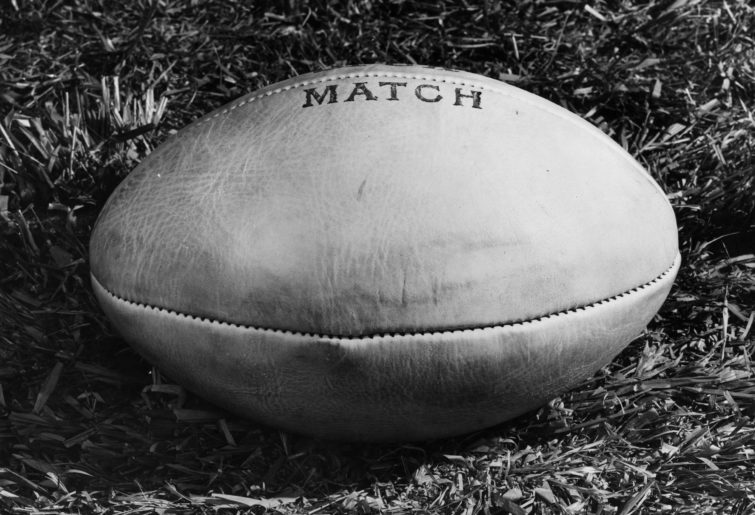
(Photo by Fox Photos/Getty Images)
Before the Lions were next to tour, in 1910, South Africa embarked on their first ever tour of Europe. This was the tour where they would first tog out with the iconic Springbok emblem on their jerseys. South Africa played 29 games on this tour, winning 26, with two lost and one drawn. They played all five Nations on tour, beating Ireland, Wales and France, losing to Scotland and drawing with England.
The Lions team that toured South Africa in 1910 was the strongest Lions selection yet, featuring a number of full internationals from Ireland, England, Scotland and Wales. The Lions also had an Australian in their ranks, the multi-talented Tom Richards, whose name has entered immortality, as the trophy awarded in the Lions series against Australia is named after him. Richards is the only man to ever play international rugby for both Australia and the Lions. Despite the calibre of their side, the 1910 Lions still lost the Test series, 3-1. Overall, the Lions played 24 matches, winning 13, drawing three and losing eight.
The 1910 tour would be the last Lions tour before the first World War broke out in 1914. Several rugby players from around the world would serve with distinction in this terrible conflict.
The Lions next tour would be to South Africa, in 1924. This would be the first tour given the official title of the British Isles Rugby Union Team. They would soon be christened ‘the Lions’ by the press. Unfortunately these players would fail to live up to their moniker as they would be the first Lions team that would win less games than they lost or drew. Out of 21 games played, the Lions won nine, lost nine and drew three. The Lions faced the usual problems of being underrepresented and the South Africans simply being too good.
One player that declined the invitation to tour was Scottish wing, Eric Liddell. Liddell instead competed in that year’s Olympic Games, where he would win medals and his story would later be immortalised in the great film, Chariots Of Fire . A player that did tour was Stanley Harris. This amazing man was born in South Africa but raised in England. He achieved international status in five different sports. He had been offered a place on the 1920 Olympics team but chose rugby instead.
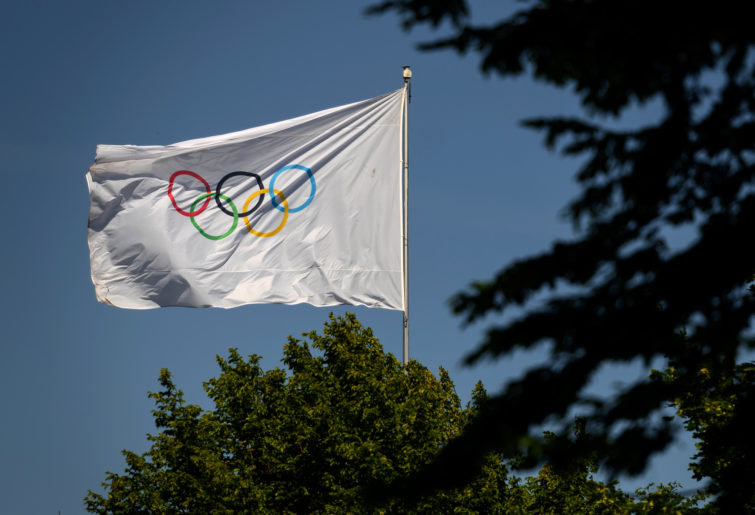
(Photo by Fabrice Coffrini/AFP via Getty Images)
Returning to South Africa he became the country’s light heavyweight boxing champion and the runner up in the heavyweight division. While injured in a rugby trial back in England, he took up ballroom dancing and won a medal in the World Amateur Championships. Returning to rugby, he played in 15 games on the 1924 Lions tour, including two Tests. He was also an international at tennis and water polo. And he also fought in both World Wars with distinction and was later awarded an OBE and CBE.
The Lions last tour before World War two was in 1938, again to South Africa. The South African team they faced would have a legitimate claim to being the best team in the world, having beaten New Zealand and Australia the previous year on tour. The Lions were again weakened by several of the top players of the time declaring themselves unavailable. Of the 29 that toured, only 18 had achieved full cap status. Despite this, the Lions still managed to win 17 of the 24 games played, including a win in the last Test, but they would again concede the Test series.
This win was the first in a Lions Test against South Africa since 1910. It was also the first win for the Lions in six Tests overall. The Lions won the first Test, 21-16, which was their biggest score achieved against the Springboks up to that point. The win came as such a surprise that when it was reported back in Europe, many thought the result a mistake and printed it as a win for South Africa! Playing against the Lions in the Test series was the great Danie Craven, who would go on to be one of the most important figures in the history of South African rugby.
The Lions next toured South Africa in 1955. They would be the first Lions squad to travel by air and would achieve the distinction by drawing the series, the best result by a Lions team since before 1900. It was also the first home series that South Africa failed to win in that same period. The Lions included some of the greats of world rugby, like Cliff Morgan and the very young Irish wing Tony O’Reilly. O’Reilly had just left school when chosen to go on tour. He would more than prove his selection by becoming the Lions top ever try scorer and would play in the next ten consecutive Tests for the Lions, over two tours.
Sports opinion delivered daily
Cliff Morgan was one of the best scrumhalves of any time and also an accomplished singer. While journeying to South Africa, he taught his teammates songs in English, Welsh and even Afrikaaner. After touching down in South Africa, the Lions gave an impromptu singing performance and the South African press lauded them as the best Lions squad to ever tour South Africa. And this was before they had played a single game! The Test series was one of the most hard fought in history, with the first Test being won by a single point. This Test match was played in front of a then-record crowd of 95,000. The 1955 Lions would draw the Test series, with two wins and two defeats.
The Lions again toured South Africa in 1962. The ’60s would prove to be a very difficult time for the Lions. That decade, the Lions played 14 Tests overall, and won only two, against Australia. The Lions would lose ten of the remaining Tests and draw two. While they did lose the series, the 1962 Lions did achieve some good results, winning 15 of the 26 games played, losing five and drawing four. The highest loss against them was in the last Test, where South Africa won 34-14. Captain of the tour was Arthur Smith, who would achieve somewhat greater success as manager of the iconic 1971 Lions in New Zealand.
Another player on tour was the young Irish second row, Willie John McBride. This was the first the Lions would see of the legendary Irishman, but certainly not the last. McBride would go on to tour with the Lions a record-equalling five times in all and achieve a Test record of 17 caps, a record that will never be beaten.
McBride was among the Lions players to next tour South Africa, in 1968. Also included in the squad was the mercurial Scottish flanker Jim Telfer, who would return to South Africa with the Lions 29 years later as assistant coach. Two of the halfbacks selected were Barry John and Gareth Edwards. The two iconic Welshmen were unable have much influence on this Test series, both being injured early in the tour, but they would make their mark on the Lions on subsequent tours. Captain of the tour was the Irishman Tom Kiernan, who kicked the majority of the Lions points in the Test series. The solitary try came from Willie John McBride.
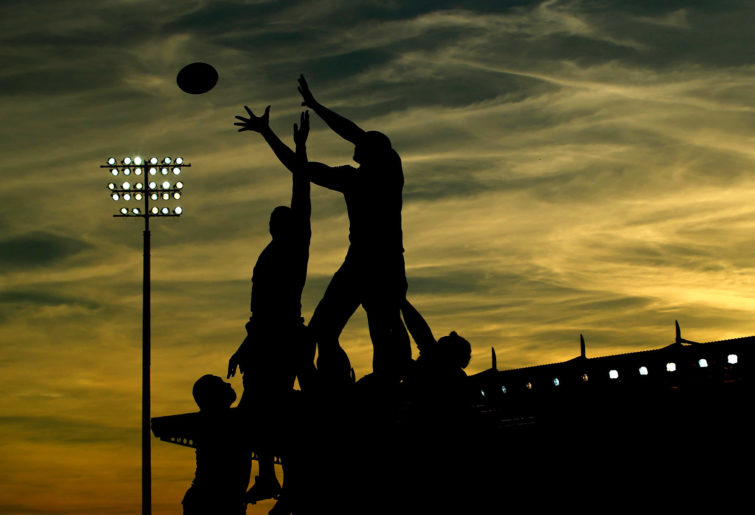
(Photo by Richard Heathcote – World Rugby via Getty Images)
Two Lions would go on to make rugby history on the 1968 tour. Irishman Barry Bresnihan became the first replacement used by the Lions in a match when he came on for an injured Mike Gibson early in the tour. And Gibson would recover to become the first replacement used in an international rugby match when he came on for Barry John in the first Test.
The next time the Lions toured South Africa was in 1974 and these Lions have gone down in history as the most successful rugby touring team in modern history, known forever more as ‘the Invincibles’. Playing 22 games, they won 21 and drew the last, which was the last Test. They accumulated a massive 729 points and inflicted on South Africa their first home series defeat since 1896.
A number of the ’74 Lions had taken part in the historic Lions series win against the All Blacks in 1971 and would go on to be recognised as some of the greatest rugby players ever. JPR Williams, Gareth Edwards, Mervyn Davies, McBride, Gordon Brown and Ian ‘Mighty Mouse’ McLauchlan played in the Test series on both tours. They were ably assisted in the series against South Africa by Welsh flyer JJ Williams, the incomparable Phil Bennett at scrumhalf, Irish flanker Fergus Slattery (who had toured in ’71 but not appeared in the Test series) and the great Bobby Windsor at hooker.
Two other players that played a main part in the Test series were English prop Fran Cotton and Scottish centre Ian McGeechan. Both would return with the Lions to South Africa 24 years later. Like many recent tours to South Africa, the 1974 Lions were threatened with boycott with many believing all ties should be cut with South Africa due to the hateful apartheid regime. Two Lions that had toured in 1968, John Taylor and Gerald Davies, refused to tour in 1974. On the other hand, there were some who believed that the Lions should tour and see for themselves the terrible effects of apartheid.
The Lions were celebrated by the black South Africans wherever they played, and the Lions would often acknowledge the support they received in the segregated stadiums. The black South Africans saw the Lions’ victories as blows to the apartheid regime as the South African rugby team at the time was seen as an almost physical manifestation of apartheid. Nelson Mandela subsequently talked about how he and his fellow prisoners would cheer on the Lions while incarcerated on Robben Island, much to the annoyance of their Afrikaners guards, listening to the games on the wireless.
The 1980 Lions faced similar outcry to their touring from governments and anti-apartheid protestors, but these objections were somewhat muted due to the US boycott of the Moscow Summer Olympics that same year. English second row Bill Beaumont, who had led England to their first Grand Slam since 1957 earlier that year, was captain.
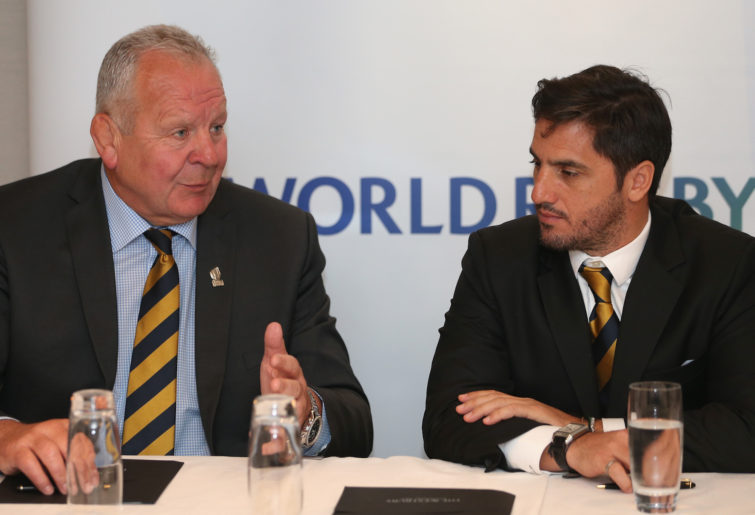
Bill Beaumont (left) has gone on to a career in administration. (Andrew Redington/Getty Images)
The Lions had a great record in the provincial games, winning all, but came undone in the Test series, losing three and winning only one. Their final record of playing 18, winning 15 and losing three was very good, all things considered. The shorter number of games was testament to how tough the Lions tours had become.
Two South Africans who played a part in the Springboks’ Test win were scrumhalf Naas Botha, who would go on to be recognised as one of the game’s best kickers, and Morne du Plessis, who would go on to manage South Africa to their first World Cup victory 15 years later.
The Lions were next to tour South Africa in 1986, but gave in to international pressure and cancelled the tour. There were two matches held that year in which South African players were invited to attend: the Lions against the Rest of the World and a Five Nations team versus a World XV. The games were held to celebrate the centenary of the founding of the International Rugby Board.
South Africa was now cut off from the rest of the rugby-playing world, although a team from New Zealand did accept money to take part in a clandestine tour of the country, much to the annoyance and disgust of their citizens. This tour was never recognised officially. Then the first World Cup was held in 1987, and South Africa really felt its isolation from world rugby. There were some around the world who asked whether the World Cup could be considered a true international competition with the absence of one of rugby’s heavyweights.
Then things changed for the better in South Africa. Nelson Mandela was released from prison in 1990 and would later be elected president of South Africa in 1994, and the apartheid regime was dismantled.
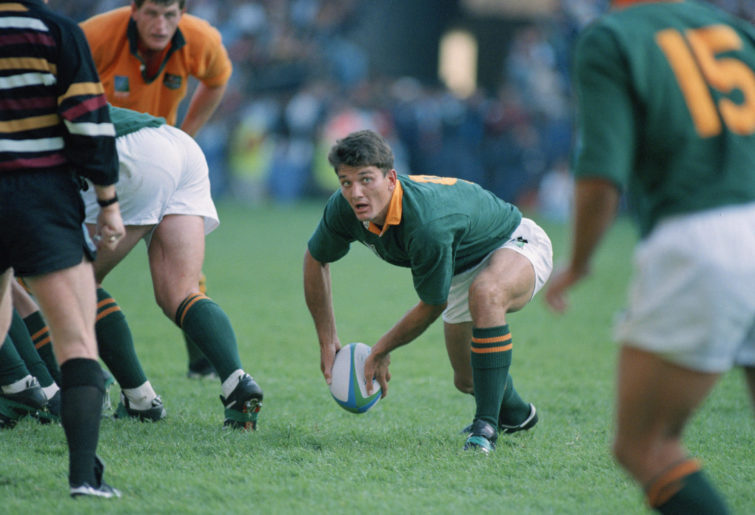
Joost van der Westhuizen at the 1995 World Cup. (Photo by Clive Mason/Getty Images)
South Africa was welcomed back to international rugby and hosted the third World Cup in 1995, which they subsequently won, with the iconic picture of South African president Mandela handing the trophy to captain Francois Pienaar. South Africa now got ready to welcome the Lions for the first time in 17 years.
The 1997 Lions would take their place as one of the top Lions teams. The team contained some future legends of the game. Martin Johnson was captain, and he would lead England to their first and only World Cup title six years later. He had fellow future World Cup winner Lawrence Dallaglio in the back row. There was also Irish hooker Keith Wood. At centre were the robust Scott Gibbs, one of several players returning from rugby league, and the sublime Jeremy Guscott, who kicked the winning drop goal to clinch the series in the second Test. Playing out of position at fullback was Welshman Neil Jenkins, who would kick most of the Lions’ points.
South Africa were in a transitional period when the Lions visited. They were without their inspirational captain and coach, Francois Pienaar and Kitch Christie, who had both played such an important role in the Springboks lifting the World Cup in 1995.
Although fielding a strong side against the Lions, including the brilliant Joost van der Westhuizen and the giant prop Os du Randt, who would win a further World Cup medal in 2007, they were without a recognised goal-kicker in the series. Although Percy Montgomery made his debut in the series and would go on to be one of the most prolific points scorers in World Rugby, he was not at that stage in his career yet. The Springboks restored some pride in winning the last Test, 35-16, but by then the series was lost.
The 2000s were a difficult time for the Lions. They won the first Test in 2001 against Australia. On a very small note, this is the first tour in which the Lions were first referred to officially as the British and Irish Lions. Before, they were simply the British Lions. But they would go on to lose that series 2-1, and then the Lions were clean-swept by New Zealand in the Test series in 2005.
When the Lions touched down in South Africa in 2009, they seemed to have the future of the brand in their hands. Many rugby people were questioning the need for continuing the Lions tours in the professional era, and another damaging defeat would be seen as the the nail in the coffin for the Lions concept. Although losing a hard-fought series 2-1, the ’09 Lions restored some much needed pride to the badge, giving their all and winning the last Test, against a South African team that were once again world champions in 2007.
The Lions return to South Africa in 2021 with Alun Wyn-Jones as captain. He’s the only survivor of the 2009 Lions team.
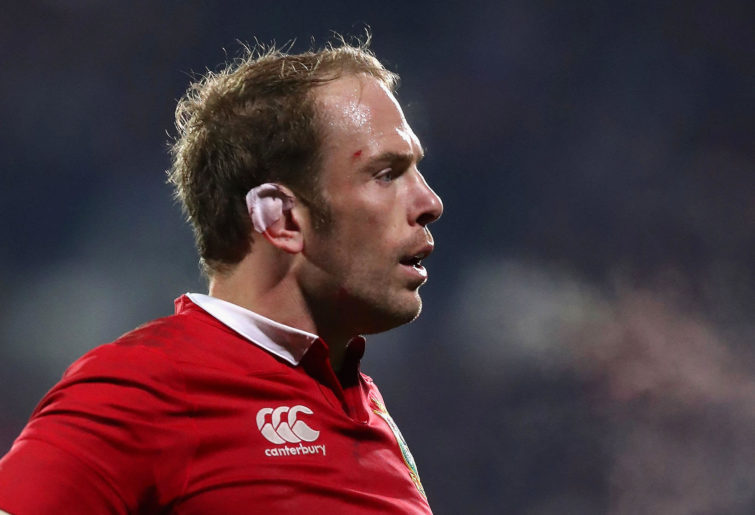
(Photo by David Rogers/Getty Images)
He leads a Lions squad full of terrific players who are scheduled to take on five clubs and a South African team that are once again world champions, having won their third World Cup in 2019. It’s sure to be a wonderful Test series and will take its place among the great tours of the last 130 years.
The Lions are a unique sport in rugby country. The idea that players from four different countries, that spend most of their time battling lumps out of each other, can come together under one badge and unite is a wonderful thing. As long as there is rugby played, it is hoped that the British and Irish Lions will continue.
I gained my of my information in writing this article from two wonderful books on the Lions. The first is the marvellous The History Of the British and Irish Lions , by Clem and Greg Thomas, which covers each Lions tour in exhaustive detail.
The second book is Behind the Lions , which has a brief summary of each tour and the thoughts and opinions of those players and management that took part.
I also gained some great insights from the terrific Rugby’s Most Bizarre Moments by John Griffiths, which provides some fascinating and often hilarious occurrences, which have taken place in rugby matches over the years, from 1871 up to now. All three are wonderful reads and I highly recommend them.
Join The Roar rugby editor Christy Doran, former Wallaby Matt Toomua and a cast of regular and special guests as they look at the biggest issues in the game on The Roar Rugby Podcast . If you’re looking for great odds on the next game check out Aussie bookmaker PlayUp . Chances are you’re about to lose. Set a deposit limit.
British & Irish Lions: The South Africa Tour explained
- British and Irish Lions
- Monday 21 June 2021 at 5:59pm
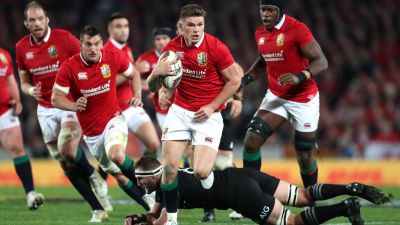
The British & Irish Lions are currently in Jersey for a training camp to prepare for their summer tour in South Africa.
At the end of their training camp, the Lions will fly to Edinburgh where they will play Japan in a pre-tour warm up match at Murrayfield, before heading to Johannesburg to commence their six-week campaign - culminating in a test clash against the Springboks.
The full tour will be played in the province of Gauteng, to reduce the need for travel for the squad and to minimise the risk of disruption due to the coronavirus pandemic.
Who are the British & Irish Lions?
The British & Irish Lions brings together the best players from England, Scotland, Wales and Ireland. The iconic red jersey is one of the most recognisable in global sport.
Warren Gatland has picked this year's squad, having been named head coach of a Lions tour for the third consecutive time.
A full rundown of the players training in Jersey is available to view here .
What is the South Africa Tour?
The Lions take on a tour every four years, on a rotation between Australia, New Zealand and South Africa. They are fiercely contested and are known for producing some of the most memorable moments in international rugby.
The tours sees them face some of the giants of world rugby in a test-match format. Often the lead up to this is preceded by matches against some of the host country's biggest clubs.
Most recently, the Lions toured in New Zealand in 2017. After defeat in their opening test against the All Blacks, Gatland's side fought back to secure a win in the second match. Ultimately, the close-fought battle ended in a draw as the final test ended 15-15.
Who will the Lions play?
Warren Gatland's side will come up against one of the sport's true heavyweights. The reigning world champions, the Springboks - South Africa's national team- and they are currently the top side in world rugby. Of the 46 times they have played against the Lions, they have taken wins in half of those games.
There will be three test matches between the sides:
First test: Springboks v British & Irish Lions (Saturday 24 July, Cape Town
Second test: Springboks v British & Irish Lions (Saturday 31 July, Johannesburg)
Third test: Springboks v British & Irish Lions (Sunday 8 August, Johannesburg)
In the run up to the test matches, the Lions will also face off against other teams from across South Africa.
Emirates Lions v British & Irish Lions (Saturday 3 July, Johannesburg)
Cell C Sharks v British & Irish Lions (Wednesday 7 July, Johannesburg)
Vodacom Bulls v British & Irish Lions (Saturday 10 July, Pretoria)
South Africa ‘A’ v British & Irish Lions (Wednesday 14 July, Cape Town)
DHL Stormers v British & Irish Lions (Saturday 17 July, Cape Town)
Will the matches be played in front of fans?
It is not yet clear if coronavirus restrictions will allow fans to attend the matches. Currently, it is planned that the games will take place behind closed doors.
Covid-secure bubbles will be in place to protect both teams and their staff during the tour. The Lions have answers to some frequently asked questions on their website for those who may have already made bookings for the fixtures.
1974 British Lions tour to South Africa
In 1974, the British & Irish Lions toured South Africa, with matches in South West Africa and Rhodesia . Under the leadership of Willie John McBride , the Lions went through the tour undefeated, winning 21 of their 22 matches and being held to a draw in the final match, albeit in controversial circumstances. The 1974 squad became known as 'The Invincibles' and regarded as the greatest rugby tour in history. [1]
Apartheid backdrop and controversy
The 99 call, results summary, test matches, second test, fourth test, bibliography, external links.
The Lions tour took place against the backdrop of widespread condemnation of the apartheid regime. Under pressure from other African nations, the International Olympic Committee had excluded South Africa from competing in the Summer Games since 1964, and there had also been protests against visiting sporting teams from South Africa.
Several rugby players, like Welsh flanker John Taylor , took a stand against apartheid by making themselves unavailable for squad selection. [2] Gerald Davies declined the tour on his personal uncomfortable position at the consequences and realities of apartheid . [3] [4]
By November 1973, the United Nations had declared apartheid "a crime against humanity " [5] and in November 1974 South Africa was suspended from participating in the General Assembly. [6]
The Lions made one more tour during Apartheid (in 1980), and did not tour South Africa again until 1997 .
The test series was beset by violence. The management of the Lions unilaterally declared that in their opinion the Springboks dominated their opponents with physical aggression because of their famous size advantage, 'off the ball' and 'blind side' play. In the buildup games, and in McBride's previous tours of South Africa, provincial sides had tended to use their physical size, late tackling and dirty play to deliberately intimidate and injure Lions players prior to Test matches. McBride again saw this tactic of targeting certain players being used by the provinces in 1974, and decided that the ' 99 call ' (originally the '999 call' but it was too slow to shout out) was meant to show that the Lions were a team and would not take any more of the violence being meted out to them. It was intended to show that the Lions would act as one and fight unsporting behaviour with more of the same. The idea was that the referee would be unlikely to send off all of the Lions if they all attacked.
At the 'Battle of Boet Erasmus Stadium ', in Port Elizabeth , one of the most violent matches in rugby history, there is famous video footage of JPR Williams running over half the length of the pitch to launch himself at Moaner van Heerden after such a call. According to McBride, the 99 call was only used once, as it sent out the message that the Lions were willing and more than able to respond in kind and protect themselves.
- Manager: Alun Thomas (Wales)
- Coach: Syd Millar (Ireland)
- J.P.R. Williams ( London Welsh and Wales)
- Andy Irvine ( Heriot's FP and Scotland)
- Tom Grace ( St Mary's College RFC and Ireland)
- J.J. Williams ( Llanelli and Wales)
- William Steele ( Bedford and R.A.F. and Scotland)
- Clive Rees ( London Welsh and Wales)
- Alan Morley ( Bristol and England) as replacement
- Richard Milliken (Bangor and Ireland)
- Ian McGeechan ( Headingley and Scotland)
- Roy Bergiers ( Llanelli and Wales)
- Geoff Evans ( Coventry and England)
- Phil Bennett ( Llanelli and Wales)
- Alan Old ( Leicester and England)
- Mike Gibson ( North of Ireland FC and Ireland) as replacement
Scrum-halves
- Gareth Edwards ( Cardiff and Wales)
- John Moloney ( St. Mary's College and Ireland)
- Bobby Windsor ( Pontypool and Wales)
- Ken Kennedy ( London Irish and Ireland)
- Ian McLauchlan ( Jordanhill College RFC and Scotland)
- Sandy Carmichael ( West of Scotland and Scotland)
- Fran Cotton (Coventry and England)
- Mike Burton ( Gloucester and England)
- Willie John McBride (capt) ( Ballymena and Ireland)
- Chris Ralston ( Richmond and England)
- Gordon Brown ( West of Scotland and Scotland)
- Roger Uttley ( Gosforth and England)
Loose forwards
- Fergus Slattery ( Blackrock College and Ireland)
- Stewart McKinney ( Dungannon and Ireland)
- Tommy David ( Llanelli and Wales)
- Tony Neary (Broughton Park and England)
- Andy Ripley ( Rosslyn Park and England)
- Mervyn Davies ( Swansea and Wales)
In muddy conditions at Newlands, the Lions took a while to settle, conceding the lead for the first time on the tour before steadying to win the opening Test comfortably. [7]
South Africa : Ian McCallum, Chris Pope, Johan Oosthuizen, Peter Whipp, Gert Muller, Dawie Snyman, Roy McCallum, Morne du Plessis, Jan Ellis, Jan Boland Coetzee, John Williams, Kevin de Klerk, Hannes Marais (c), Piston van Wyk, Sakkie Sauerman
Lions : JPR Williams, Steele, Milliken, McGeechan, JJ Williams, Bennett, Edwards, Davies, Uttley, Slattery, Brown, McBride (c), Cotton, Windsor, McLauchlan
The Lions went in at half-time with a 10–3 advantage, thanks to two tries from J. J. Williams. The lead was reduced to 10–6 when Bosch scored a penalty early in the second half, but that was as close as the Springboks came. Thereafter the Lions took control, with tries to Bennett, Brown and Milliken. [8] It was up to that point the heaviest defeat in Springbok history. [9]
South Africa : Ian McCallum (replaced Snyman, replaced Vogel), Chris Pope, Jackie Snyman, Peter Whipp, Gerrie Germishuys , Gerald Bosch, Paul Bayvel , Dugald MacDonald , Jan Ellis , Morne du Plessis , John Williams, Kevin de Klerk, Hannes Marais (c), Dave Frederickson, Nic Bezuidenhoudt
Lions : J. P. R. Williams , Steele, Milliken, McGeechan, JJ Williams, Bennett, Edwards, Davies, Uttley, Slattery, Brown, McBride (c), Cotton , Windsor, McLauchlan
Following the humiliation of Pretoria, the Springbok selectors made drastic changes, keeping only five players from the previous match in the starting line-up. One of the most bizarre changes, however, involved bringing in Free State loose forward Gerrie Sonnekus to play out of position at scrumhalf, [10] a move which had disastrous consequences. In the opening half-hour, the Springboks produced their best rugby of the series so far, and the desperation with which they played prompted Lions centre Dick Milliken to reflect years later that he had "never experienced such intensity on a rugby pitch". [11] Much like the earlier match against Eastern Province at the same venue, [12] the occasion was marred by outbreaks of violence, such that the match has since been dubbed the 'Battle of Boet Erasmus'. The brawling was probably fueled by the win-at-all-costs mentality with which the Springboks were playing, as well as the resolution of the Lions players not to be cowed by their opponents' famed physicality. Despite the Springboks having the better of most of the first half, they still went into the main break down 7–3 after Gordon Brown snatched the ball from a lineout and crashed over the line in injury time.
After the initial onslaught, the Lions regrouped and as the Springboks began to tire, they took complete control in the second half. As the forwards began to assert themselves, the backs were able to launch attack after attack on the Springbok line. Winger J. J. Williams scored two superb tries; the first came from a brilliant one-two pass combination with J. P. R. Williams, and the second was the result of a brilliant kick-and-chase. [13]
At the end of the match, Lions captain McBride was carried off on the shoulders of Bobby Windsor and Gordon Brown. It was the first time since 1896 that the British Isles had won a series in South Africa, and the first time since 1910 that a touring side had beaten the Springboks at Boet Erasmus stadium. Danie Craven , the president of the South African Rugby Board, congratulated the Lions on their historic achievement, acknowledging that the visitors had indeed been "the better team". [13]
South Africa : 15 Tonie Roux, 14 Chris Pope, 13 Peter Cronje, 12 Jan Schlebusch, 11 Gert Muller, 10 Jackie Snyman, 9 Gerrie Sonnekus, 8 Klippies Kritzinger, 7 Jan Ellis, 6 Polla Fourie, 5 Johan de Bruyn, 4 Moaner van Heerden (replaced by De Klerk), 3 Hannes Marais (c), 2 Piston van Wyk, 1 Nic Bezuidenhoudt; Replacements: 16 Kevin de Klerk, 17 Malcolm Swanby, 18 Gavin Cowley, 19 Gert Schutte, 20 Andre Bestbier, 21 Rampie Stander
Lions : 15 J. P. R. Williams, 14 Andy Irvine, 13 Ian McGeechan, 12 Dick Milliken, 11 J. J. Williams, 10 Phil Bennett, 9 Gareth Edwards, 8 Mervyn Davies, 7 Fergus Slattery, 6 Roger Uttley, 5 Willie John McBride (c), 4 Gordon Brown, 3 Fran Cotton, 2 Bobby Windsor, 1 Ian McLauchlan; Replacements: 16 Mike Gibson, 17 Billy Steele, 18 John Moloney, 19 Ken Kennedy, 20 Sandy Carmichael, 21 Tony Neary
After winning the first three test matches, the Lions drew the final test in controversial circumstances. In the dying minutes, Irish flanker Fergus Slattery broke through the South African line and appeared to successfully ground the ball, only for the (South African) referee to adjudge it held up; the Lions couldn't believe it, and Slattery himself later stated to the British newspapers that even the South African players thought that he had scored a legitimate try. Moreover, the referee blew the final whistle four minutes early with the Lions still just two metres from the South African try line, thus preserving their unbeaten record, but denying them a tour whitewash. When asked about the decision afterward, the referee was said to have replied: "Look boys, I have to live here". [1] JPR Williams later recalled that he struggled to understand the elation that South Africans felt in drawing the match. [10]
South Africa : Tonie Roux, Chris Pope, Peter Cronje, Jan Schlebusch, Gert Muller, Jackie Snyman, Paul Bayvel, Kleintjie Grobler, Jan Ellis, Klippies Kritzinger, John Williams, Moaner van Heerden, Hannes Marais (c), Piston van Wyk, Nic Bezuidenhoudt (replaced by Stander)
Lions : J. P. R. Williams, Irvine, McGeechan, Milliken, J. J. Williams, Bennett, Edwards, Davies, Uttley, Slattery, Ralston, McBride (c), Cotton, Windsor, McLauchlan
The Lions previous series in South Africa had all been losses, apart from the drawn 1955 series.
South Africa had not lost a home Test series since 1958 against France. In their most recent internationals they had won series against NZ at home in 1970 and against Australia away in 1971. They won their subsequent series, against NZ at home, in 1976.
However, they had not played a test match for two years before playing the Lions. [14]
Danie Craven said the 1974 Lions were "the greatest team to visit South Africa".
Many of the players who also played on the victorious 1971 Lions tour to New Zealand believe the 1974 Lions team would have beaten the 1971 Lions team, due to having better forwards and because many of the 1971 players had become better players by 1974. [15] J.P.R. Williams has said that whilst the 1971 Lions back division could not be bettered, the 1974 squad was better at winning games. [16]
- Jenkins, Vivian (1975). Rothmans Rugby Yearbook 1975–76 . Brickfield Publications. ISBN 0-362-00221-5 .
- Reason, John (1974). The unbeaten Lions: The 1974 British Isles Rugby Union tour of South Africa . Rugby Books. p. 258. ISBN 9780903194020 .
- Thomas, J. B. G. (1974). The greatest Lions : the story of the British Lions tour of South Africa, 1974 . London: Pelham. p. 175. ISBN 0720707862 .
Related Research Articles
The British & Irish Lions is a rugby union team selected from players eligible for the national teams of England, Ireland, Scotland, and Wales. The Lions are a test side and most often select players who have already played for their national team, although they can pick uncapped players who are eligible for any of the four unions. The team currently tours every four years, with these rotating between Australia, New Zealand and South Africa in order. The most recent test series, the 2021 series against South Africa, was won 2–1 by South Africa.
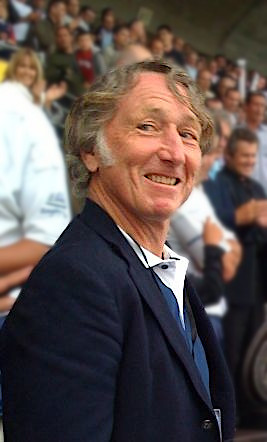
John Peter Rhys Williams was a Welsh rugby union player who represented Wales in international rugby during their Golden Era in the 1970s. He became known universally as J. P. R. Williams four years after his Welsh debut, in 1973 when J. J. Williams joined the Welsh team.
William James McBride , CBE, better known as Willie John McBride is a former rugby union footballer who played as a lock for Ireland and the British Lions. He played 63 Tests for Ireland including eleven as captain, and toured with the Lions five times; a record that gave him 17 Lions Test caps. He also captained the most successful ever Lions side, which toured South Africa in 1974.
Cameron Michael Henderson Gibson MBE is a former rugby union international player who represented Ireland and the British & Irish Lions.
Thomas Gerald Reames Davies CBE DL is a Welsh former rugby union wing who played international rugby for Wales between 1966 and 1978. He is one of a small group of Welsh players to have won three Grand Slams including Gareth Edwards, JPR Williams, Ryan Jones, Adam Jones, Gethin Jenkins and Alun Wyn Jones.
In 1971 the British Lions toured New Zealand, also playing two matches in Australia. Despite losing the first match to Queensland the tour was a great success, the Lions winning the Test series against the All Blacks. They are still the only Lions side to have won a Test series in New Zealand. The side was captained by John Dawes, coached by Carwyn James and managed by Doug Smith.
EPRU Stadium , also known by its original name of Boet Erasmus Stadium , was a stadium in Port Elizabeth, South Africa. The letters "EPRU" in the name represent the Eastern Province Rugby Union, the stadium's historic primary tenants, whose team is now known as the Mighty Elephants. The original name Boet Erasmus Stadium was named after Boet Erasmus, a former mayor of Port Elizabeth. The stadium held a capacity of 33,852 people and served primarily as a venue for rugby union matches but also hosted a number of association football (soccer) fixtures.
A World XV is a rugby union team organised on an unofficial, ad hoc basis and typically composed of invited players from various countries. Several World XVs have been arranged by various bodies since the 1970s, often to take part in celebration and testimonial games, usually against national teams, but these are not considered test matches by most nations.
The 2009 British & Irish Lions tour to South Africa was an international rugby union tour which took place in South Africa from May to July 2009.
In 1977 the British Lions rugby union team toured New Zealand. The Lions played 26 matches, including four internationals against the All Blacks. They lost the series against the All Blacks by three matches to one. The team played as the British Isles in their internationals against the All Blacks and the British Lions for the non-international games. Unlike all previous tours to New Zealand, the Lions did not play any matches in Australia, though one game was also played at Buckhurst Park, Suva, against Fiji.
Johannes Lodewikus 'Moaner' van Heerden is a former South African rugby union international player. He played as a lock.
The Proteas was the representative side of the South African Rugby Football Federation, one of three racially segregated rugby union governing bodies in apartheid South Africa.
The History of the South Africa national rugby union team dates back to 1891, when the British Lions first toured South Africa where they played against South African representative sides. The South Africa national rugby union team played few international matches during a period of international sanctions due to apartheid. Since the end of apartheid in 1994, South Africa has once again fully participated in international rugby.
These are the 1975 Five Nations Championship squads :
These are the 1974 Five Nations Championship squads :
These are the 1973 Five Nations Championship squads :
Kevin Brian Henry de Klerk is a former South African rugby union player.
Willem Pieter Stapelberg is a former South African rugby union player.
- 1 2 Mitchell, Kevin (3 May 2009). "The Lion kings" . The Guardian . Retrieved 7 July 2019 .
- ↑ Taylor, John (11 July 2014). "Lions and the fight against apartheid" . ESPN.
- ↑ Bills, Peter (17 July 2008). "Gerald Davies on the adventure of the Lions" . The Independent . London. Archived from the original on 1 May 2022 . Retrieved 3 May 2010 .
- ↑ Live, North Wales (16 May 2009). "Gerald Davies: A Lion's Tale" . North Wales Live .
- ↑ "International Convention on the Suppression and Punishment of the Crime of Apartheid. Adopted by the General Assembly of the United Nations on 30 November 1973" (PDF) .
- ↑ Teltsch, Kathleen (13 November 1974). "South Africa Is Suspended By U.N. Assembly, 91‐22" . The New York Times . Retrieved 7 July 2019 .
- ↑ "Springboks promise a different result on Pretoria's hard ground" . The Times . No. 59111. Reuters . 10 June 1974. p. 11 . Retrieved 8 July 2019 .
- ↑ Jenkins, Vivian (23 June 1974). "South Africa handed beating of all time" . The Sunday Times . No. 7880. p. 21 . Retrieved 8 July 2019 .
- ↑ "South Africans rake over ashes of heaviest defeat" . The Times . Reuters . 24 June 1974. p. 9 . Retrieved 8 July 2019 .
- 1 2 Dolan, Damian (15 May 2009). "JPR Williams remembers the call of 99" . The Independent . Archived from the original on 1 May 2022 . Retrieved 7 July 2019 .
- ↑ Barclay, Tristan (13 July 1974). "Lions victorious in Battle of Boet Erasmus" . ESPN . Retrieved 7 July 2019 .
- ↑ "Kicking and punching mar Lions' brilliant victory" . The Times . No. 59099. Reuters. 27 May 1974. p. 9 . Retrieved 7 July 2019 .
- 1 2 "British Lions accepted as kings" . The Times . No. 59139. Reuters. 15 July 1974. p. 7 . Retrieved 7 July 2019 .
- ↑ O’Reilly, Peter. "Dick Milliken: The Springboks were physical and frightening – but they believed we were invincible" – via www.thetimes.co.uk.
- ↑ Willie John McBride , Ian McLauchlan , Ian McGeechen , Fergus Slattery , Chapter 24, Undefeated, Rhodri Davies
- ↑ Orders, Mark (4 March 2019). "The life of JPR at 70, a Welsh rugby great who was different from the rest" . Wales Online .
- 1974 British Lions tour to South Africa at Lions Rugby
- " The Power of Four "
- Living with Lions
On this day: The Lions draw second Test of 1903 Tour with South Africa
In September 1903, The British & Irish Lions came head-to-head with South Africa in a hugely tense second Test in Kimberley.
As a gruelling 1903 Tour spanning over two months was coming to an end, the Lions (who had not officially been given that title), on only their fifth Tour and third in South Africa, were locked in an even Test series.
The Tour began in July, where a squad of 21 Lions , led by captain Mark Morrison, arrived for an intense 22-match schedule, playing throughout South Africa, with some matches as little as two days apart.
It did not get off to the best of starts for the tourists, losing their opening three matches against Western Province Country, Western Province Towns and Western Province respectively in Cape Town.
That preceded a run of five games in just nine days in the Eastern Province, with the Lions winning all five, most notably a 37-3 win over King William’s Town.
The matches continued to come thick and fast, with the Lions losing twice to Griqualand West in Kimberley, where they would play the second Test a month later.
- On This Day: The first ever Lions match
More wins came in Durban, Pretoria and Johannesburg and by the time the Test series began, the Lions had won nine and lost seven in just over five weeks.
Tries from William Cave and a phenomenal effort from Reg Skrimshire saw the Lions draw the first Test 10-10 in front of a crowd of 5,000 people in Johannesburg’s now famous Wanderers Ground, with John Gillespie adding two conversions.
The tourists took their winning tally to 11 with two further matches in between the first and second Test, defeating Orange River County 17-16, before a revenge 11-5 win over Griqualand West back in Kimberley.
Three days later and they were in Test action once more, in their fourth match in Kimberley, exactly 120 years ago today.
Incredibly, after such a long Tour, the Lions made just two changes to their starting XV, as Robert Neil came in at full-back for Edward Harrison and Edward Walker, who never ended up representing England, replaced Ian Davidson on the right wing.

Once again, the Lions were led out onto the Johannesburg turf by Morrison, the first Scotsman to captain the Lions , in a team that contained five Scots, six Englishmen, three Irishmen and one Welshman – Skrimshire, who scored 10 tries and 59 points on the Tour.
Included in the forward pack with Morrison were Alfred Tedford, widely regarded as one of Irish rugby’s greatest ever forwards and David Bedell-Sivright, who would captain the Lions the following year in Australia and New Zealand.
South Africa did not come out in their now famous green and gold, wearing white as they had done in the first Test.
“For all of us, there’s going to be a little tingle in the spine when we see those red jerseys run out onto the rugby playing fields of South Africa….” 23 years ago this week the ’97 Lions kicked off the Tour of South Africa – this is the first jersey presentation of the Tour! pic.twitter.com/AT3Ybu5J3U — British & Irish Lions (@lionsofficial) May 28, 2020
It was their chosen home strip for the very last time in Kimberley – donning the green shirts supplied by captain Barry Heatlie’s Old Diocesan’s Club in the third Test at Newlands after their success in 1896, and forever adopting them since.
South Africa’s side included local hero Fred ‘Uncle’ Dobbin, a scorer in the first Test as well as players who became household names, such as Paddy Carolin, Japie Krieg and Bob Loubser.
The match itself proved to be very much a match of two halves, with South Africa, who became known as the Springboks three years later in 1906, largely in charge in the first half.
The Lions did bounce back though and were dominant in the second half, although neither side were able to manage a score in a game that ultimately finished 0-0.
- On This Day – In 1891 The British & Irish Lions play their first-ever Test against South Africa
The result meant it was once again all to play for in the third Test and in the process, legendary prop Frank Stout became the first Lion to be involved in two series deciders, after his success four years previously in Australia.
This time around he was not as successful as South Africa, back in the green jerseys in front of 6,000 spectators in a game that became known as ‘the Umbrella Test’ due to the heavy rain in Cape Town, triumphed.
Joe Barry and Alec Reid got the tries in the third Test, as South Africa again held the Lions to zero on the scoreboard, although Skrimshire did have a try disallowed for a forward pass, winning 8-0 to see the Lions lose a series for the first time.
It was an historic moment in rugby, with South Africa making their mark and quickly becoming one of the sport’s true heavyweights.
Incredibly, South Africa would not lose another Test series for 53 years, when they were beaten 3-1 by New Zealand in 1956.
The Lions were victorious the following year, defeating Australia 3-0 but they did not succeed in South Africa again until 1974, when Willie John McBride led the Lions to a famous series win in a Tour that, unlike in 1903, they went unbeaten, winning 21 and drawing one of the 22 matches.
Related Players
Related fixtures, latest news, book your place on tour, the wedding anniversary of a lifetime, howell family set to create special memories in australia, the story behind the artwork.
- International edition
- Australia edition
- Europe edition
South Africa 19-16 British & Irish Lions: third and final Test – as it happened
Morne Steyn’s late penalty settled a tense, tight deciding contest and broke Lions hearts in a repeat of the 2009 series
- 7 Aug 2021 South Africa win the series 2-1!
- 7 Aug 2021 Penalty! South Africa 19-16 Lions (Steyn)
- 7 Aug 2021 Penalty! South Africa 16-16 Lions (Russell)
- 7 Aug 2021 Penalty! South Africa 16-13 Lions (Steyn)
- 7 Aug 2021 Penalty! South Africa 13-13 Lions (Russell)
- 7 Aug 2021 South Africa 13-10 Lions (Pollard con)
- 7 Aug 2021 TRY! South Africa 11-10 Lions (Kolbe)
- 7 Aug 2021 Here we go again
- 7 Aug 2021 Half time! South Africa 6-10 British & Irish Lions
- 7 Aug 2021 Penalty! South Africa 6-10 Lions (Pollard)
- 7 Aug 2021 TRY! South Africa 3-10 Lions (Owens 20')
- 7 Aug 2021 Penalty! South Africa 3-3 Lions (Russell)
- 7 Aug 2021 Penalty! South Africa 3-0 Lions (Pollard)
- 7 Aug 2021 Here we go!
- 7 Aug 2021 The teams
- 7 Aug 2021 Preamble
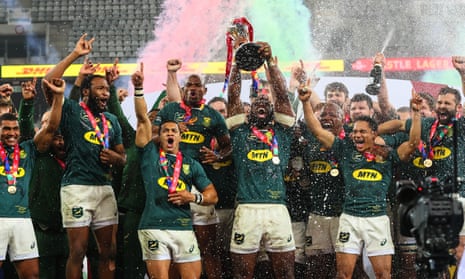
What next for Gatland?
Gerard Meagher on Finn Russell.
Player ratings.
I’ll leave you with Rob Kitson’s match report from Cape Town, and we’ll have much more reaction and analysis of South Africa’s win to come. Thanks for joining me, and enjoy the rest of your weekend, wherever you are.
Here’s the Springbok captain, Siya Kolisi: “As soon as Morne went for the kick, I said no way! I’m really happy for him, and the team. Really proud of the team, particularly with all the turmoil in our country – I hope we gave people something to smile about. We tried to do everything better and harder in the second half. [Lions series] every 12 years – I’ll never get this chance again, most of this team won’t.
He is asked what he would say to kids watching, who will feel inspired by the win. “Without this team, I wouldn’t be where I am [but] to someone who comes from a similar situation [to me], you’ve got to protect your dreams, believe in them no matter what your circumstances are.”
As the Lions trudge down the tunnel, it’s time for Siya Kolisi to hoist the trophy as fireworks fill the sky. It’s the closest South Africa fans will get to seeing the action in this shut-off series – but amid Covid-19 and civil unrest, their team have followed up a World Cup with a Lions series win.
We’ll have Rob Kitson’s match report, and plenty more reaction, online shortly. Here’s a sneak preview:
They do not come much more tense than this. Nor, from a British & Irish Lions perspective, do they come any more gut-wrenching. For the second time this century South Africa have clinched a Lions series by the tiniest of margins via the boot of the same man, Morne Steyn, who popped up with a penalty goal in the 79th minute to break Lions hearts just as he did in Pretoria in 2009.
Congratulations SA. Series win. Hugely painful for Lions & fans. But nothing to be gained by pointing fingers etc. Just have to accept the result. 🦁🙏 — Will Carling (@willcarling) August 7, 2021
Heartbroken for the @lionsofficial 💔 — ugo monye (@ugomonye) August 7, 2021
It’s a repeat of the 2009 tour, with Morne Steyn’s late penalty a dagger for the Lions once again. The Lions will look back on missed opportunities – the Adams overlap, turning down kicks at goal. This one will sting for a while.
Alun Wyn Jones: “Hugely disappointed with the result, but I’m very proud of the team. We wanted to come out for the second half with more of the same, we did that probably after the early exchanges, then the to-ing and fro-ing with the penalties broke up the game.”
He backs the “brave call” to go for the corner with the late penalty, pointing out that it worked in the first half. He finds it tough to say much more, the emotion taking over. He looks gutted, having left it all out on the field.
South Africa win the series 2-1!
Full time: South Africa 19-16 Lions The scrum folds, it’s a South Africa penalty, and Steyn just needs to kick it into touch. That feels like a fitting end.
Bravo South Africa – they got the job done. It was a battle on a razor’s edge for that entire second half, but it’s the world champions who prevail!
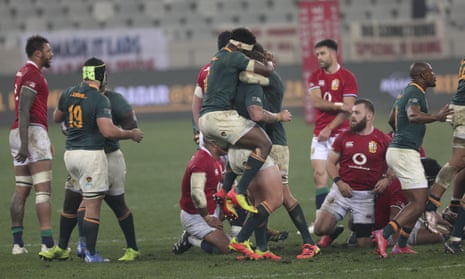
80 mins: Marx, the final front-row replacement, isn’t penalised for not releasing, with the Lions getting a scrum. There are two seconds left as Murray puts in ...
Penalty! South Africa 19-16 Lions (Steyn)
It’s there, and South Africa have one minute to hold on for the series win!
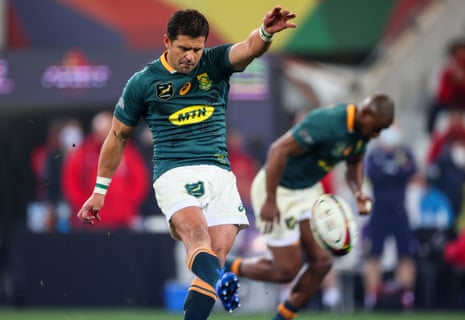
78 mins: No, it’s a South Africa penalty, Lions not moving away – although it looks like Jantjies has wasted it with a tap-and-go. It’s called back by Raynal – he started from the wrong mark. What a let-off that is!
In other news, Damian Willemse is on for the Springboks, replacing Le Roux. But never mind that – Steyn will have the chance to win another series with his boot ...
77 mins: Russell knocks on under Jantjies’ high ball. The imperious De Allende collects, and South Africa are edging towards drop goal territory ...
76 mins: How are your nerves? An exchange of box kicks, and it’s Lions ball. Russell sends a grubber through, Steyn almost spills it close to his own try line, but recovers and clears away ...
Penalty! South Africa 16-16 Lions (Russell)
Big pressure on Finn Russell with five minutes to play. Not that you could tell – he nails the kick, and we are level again!
74 mins: South Africa have a chance to ease the pressure, but the Lions wrestle the ball back. Henshaw charges upfield, but looks isolated. No matter, he holds the ball up fairly and forces the penalty!
72 mins: Another reset, and this time the Lions pack wobbles. South Africa penalty, and a chance to clear away.
71 mins: Gatland doesn’t fancy another drawn series, it seems. Murray puts in, but the scrum folds like a house of cards. Alun Wyn Jones allows himself a wry smile on the touchline. We go again ...
70 mins: Simmonds leads the charge and the rolling maul barrels over the line – but Raynal says it was held up. Five-metre scrum, more treatment required for Etzebeth.
69 mins: They turn down the three points and kick for the corner. This could be the series, right here ...
68 mins: The Lions don’t want to die wondering here – time to get back on the front foot. Van der Merwe breaks into space down the left and while South Africa get back in numbers, Etzebeth concedes a penalty. Advantage for Lions and when the move breaks down, they take the penalty.
Penalty! South Africa 16-13 Lions (Steyn)
He never looked like missing, and South Africa edge back in front!
66 mins: An immediate chance for Steyn to put South Africa back ahead, as the Lions concede. It’s a long way out, tight to the right touchline ...
65 mins: Sam Simmonds is on in the Lions back row, making his debut as Jack Conan heads to the bench. Kolisi has come back on for the final throes.
64 mins: A change at scrum-half for South Africa, with Herschel Jantjies on for the impressive Reinach. And Morne Steyn, the man who broke Lions’ hearts in 2009, is on for Pollard!
Penalty! South Africa 13-13 Lions (Russell)
Forty metres out and central, Russell drills through the post. We’re level again!
62 mins: Just as the Springboks had the game in their grasp, a moment of ill discipline presents the Lions with a penalty as Wiese shoves Russell. The fly-half will have a chance to level ...
61 mins: A welcome, if minor, shift in momentum for the Lions as South Africa concede at a scrum. Russell kicks handily downfield. Trevor Nyakane and Vincent Koch come into the Boks’ front row. Alun Wyn Jones’ race is run – he’s replaced by Adam Beard after another mighty performance.
60 mins: That Kolbe try illustrates why South Africa are world champions. They had a brief opportunity, little more than a half-chance, and they were absolutely ruthless.
59 mins: The mistakes are piling up for the Lions, wilting under the heat of the expected “Boklash”. Conor Murray is on for Price, Kyle Sinckler replaces Furlong. Twenty minutes to save the series ...
South Africa 13-10 Lions (Pollard con)
It does indeed, with Raynal finding no video evidence of a knock-on from Wiese. Alun Wyn Jones is not happy, but it’s hard to argue. Pollard adds the extra points.
TRY! South Africa 11-10 Lions (Kolbe)
Le Roux finds Kolbe in space, but the wing still has work to do. In a flash, he powers through the gears, twists beyond Liam Williams and races for the corner! You have to say that’s magnificent. The high ball is being checked at length, but I think this will stand.
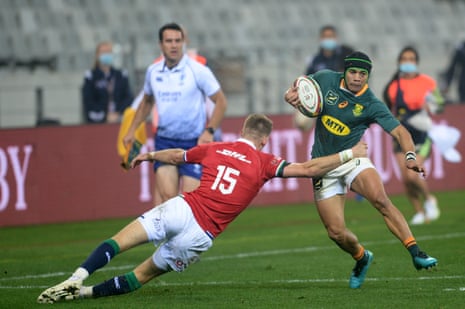
56 mins: Or not. Wiese wins a high ball, and Am collects and offloads to Le Roux, who skips into space and draws Conan off the touchline ...
55 mins: Not sure what happened with Kolisi – he may have picked up an injury – but he’s potentially a big loss ...
Another miss! This is a tougher kick than the one Pollard missed five minutes ago – but the result is the same, hooked wide of the near post. Kwagga Smith comes on for Siya Kolisi, while Luke Cowan-Dickie is on at hooker for the Lions.
Kolbe slipped as Russell went in, meaning that the Lions fly-half caught Kolbe full in the face with his arm. Because of the slip, Raynal will award a penalty, but no yellow card.
- British & Irish Lions
- South Africa rugby team
- Rugby union
Most viewed

Louis Rees-Zammit: From breakout teenage sensation to joining the Super Bowl champions
L ouis Rees-Zammit has already had an incredible rugby career despite being 23 years old and embarks on a new challenge as he chases his NFL dream.
As the prospect of the Welshman signing his inaugural NFL contract looms, we reflect on the pivotal moments that have shaped his professional sports journey thus far, a journey brimming with incredible moments.
Rees-Zammit started his rise to the top in the Cardiff youth ranks but made the move to England when he joined Hartpury College and the Gloucester Academy.
He quickly caught the eye in the U18s Academy League, and before long, he was training with the senior squad.
On April 13, 2019, a fresh-faced 18-year-old was listed on Gloucester’s bench for the Premiership clash against their rivals, Bath. In the final five minutes of the 27-23 victory, he made his debut, etching his name in history as the youngest Gloucester player to do so at the age of 18 years and 70 days.
That September, he earned his first start in the Premiership Rugby Cup clash against London Irish, scoring a try in the latter stages of the match, and the following month was when things really kicked off for the teenager.
While he showed flashes of brilliance through 2019, the game that really launched his career was the Premiership fixture against Worcester Warriors, a match where he scored two tries and assisted another and backed that up with a stunning hat-trick against Northampton Saints just eight days later.
His stunning showing against Northampton made him the youngest player ever to score a Premiership hat-trick and put him squarely in the conversation for international honours.

International calls
Born in Penarth, Wales, there were hopes that the teenager sensation would delay a Test debut and wait until he was eligible to represent England.
However, that was not the route the proud Welshman was willing to take despite the efforts of his girlfriend at the time, whose father is ex-England and Manchester United star Paul Scholes.
After lighting up the Premiership with Gloucester, he was already on the radar of the Wales Test team and despite his youth, he was called up to Wayne Pivac’s squad to prepare for the 2020 Six Nations.
The then-head coach famously quipped that “if you are good enough, you are old enough”, and in Rees-Zammit’s case, that certainly rang true.
He would have to wait until October 2020 to make his debut at the age of 19 in the rescheduled Six Nations match against France, coming off the bench for the side.
That November, he would score his first Test try for Wales, dotting down in the 18-0 win over Georgia, and from that moment, looked to be a regular starter for his country going forward.
Delivering on his promise in 2021
After showing signs of brilliance in his first two years as a professional, Rees-Zammit’s rapid rise thundered through the atmosphere in 2021.
He quickly cemented himself as a first-choice option in the Wales team as he started all five of their Six Nations matches, scoring four tries as Pivac’s charges went on to claim the title.
His four tries saw him finish just one behind Scotland’s Duhan van der Merwe as the tournament’s top try scorer, but the 20-year-old had delivered sensational performances in a crucial year for England, Ireland, Scotland and Wales players – a British and Irish Lions touring year.
He crucially scored in the 21-16 victory over Ireland in the opening game, a try that edged Wales in front in the closely fought encounter. He backed that up with a man-of-the-match performance against Scotland, scoring twice in the fixture, including a sensational try to seal the result with a classic chip and chase – something that has since become somewhat of a trademark for the speedster. He would score and assist another in the hammering of Italy.
Earning a British and Irish Lions call-up
His brilliance in the Six Nations naturally led to him being tipped to crack Warren Gatland’s squad for the 2021 British and Irish Lions tour to South Africa – the highest honour for any England, Ireland, Scotland or Wales players.
He clearly had done enough to impress Gatland to earn his place in the squad and became the youngest Lion selected since the 1959 Lions tour to Australia and New Zealand at the age of 20 years and 93 days.
Whilst he was unable to crack the Test team against the defending world champion Springboks, he did play in four touring matches scoring three tries – grabbing his first just five minutes into his Lions debut.
First World Cup
His sensational rise to the top of international rugby showed no signs of slowing down after playing for the Lions as he continuously delivered on his talents for club and country.
Having consistently started for the Cherry and Whites and Wales throughout the years, when the 2023 World Cup came around, he was an easy choice for returning Wales boss Gatland when he named his squad for the global tournament in France.
Little would we know, but this would be his final international tournament before making his career-altering decision.
Again, he rose to the occasion in his first World Cup, scoring five tries in five matches as Wales over-performed on their expectations, reaching the quarter-finals of the competition, where they were knocked out by Argentina.
He earned 32 Test caps for Wales, scoring 14 tries.
Shock decision
On January 16, Gatland was preparing to name his squad for the upcoming 2024 Six Nations when he was delivered the news that he would not be able to select Rees-Zammit.
Gatland wished his star man well in his pursuit after the speedster made the quick-fire decision to join the NFL’s International Player Pathway.
“He is probably a bit of a freak as an athlete. He is a freak physically, and he gets a chance to challenge himself,” the Wales coach said.
The decision was made public that Tuesday and Rees-Zammit flew out to Florida that Friday for the 10-week intensive training camp.
“I think now is the perfect time, with my age and picking up a new sport,” Rees-Zammit said of his decision. “It’s nothing about rugby; it’s an ambition to make my dream come true and play in the National Football League.
“As a little boy, my dad always brought me up to be a big NFL fan. He used to play American football. It’s about continuing his legacy and go beyond, making him proud. It’s the sport he grew up loving. I want to do that and make him as proud as I can.”
Making his mark
After the intensive training camp, he participated in the rigorous testing as part of the NFL’s IPP Pro Day trials.
While he confessed that he was not pleased with his performance on the day – completing a 40-yard dash in 4.44 seconds after previously completing that distance in 4.3 seconds in training – he certainly caught the scouts’ eye.
In the days that followed, he visited the facilities of the New York Jets, Cleveland Browns, Denver Broncos, and the Super Bowl champions, the Kansas City Chiefs.
His pace is bound to be a massive asset if he does realise his NFL dream and is primed to feature as a wide receiver, a running back and a kick returner in the special teams.
Signing for the Chiefs
According to reports, the Kansas City Chiefs have won the race for Rees-Zammit’s signature, with the Welshman set to bolster Patrick Mahomes’ attacking threats.
The news comes off the back of the ex-rugby star joining Jay-Z’s sport agency, Roc Nation, the same agency as Springbok captain Siya Kolisi.
READ MORE: Louis Rees-Zammit’s rapid NFL rise continues with a deal to join Patrick Mahomes at Super Bowl champions – report
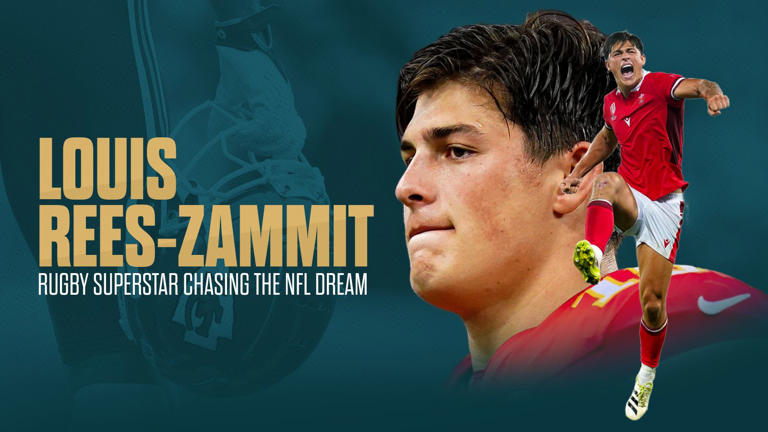
- Transfer Centre
- Live on Sky
- Get Sky Sports
- Kick It Out
- Black Lives Matter
- British South Asians in Football
- Work @ Sky Sports
- Terms & Conditions
Rugby Union
British and Irish Lions 2025: Which Six Nations stars would make the Lions right now?
We take a closer look at which stars from the 2024 Six Nations could be on the plane to Australia for the Lions; Watch every game of 2025 British and Irish Lions tour of Australia, including all three Test matches against the Wallabies, exclusively live on Sky Sports
Digital Sports Journalist @MegWellensX
Tuesday 19 March 2024 08:20, UK
Please use Chrome browser for a more accessible video player
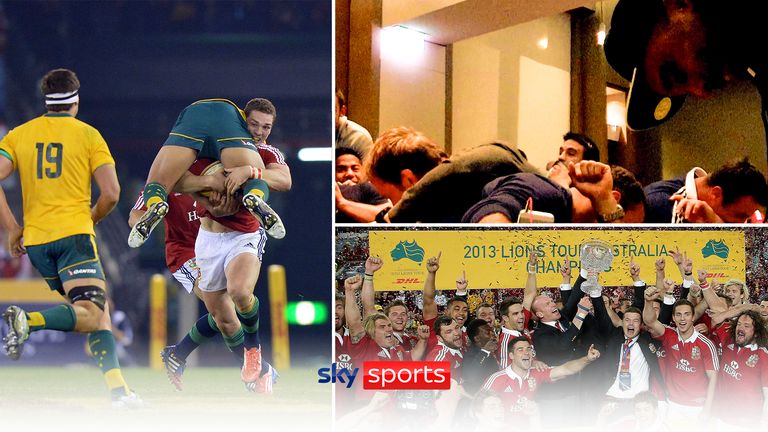
While the British and Irish Lions Tour to Australia might be over a year away, with the Six Nations wrapping up, there is never a more opportune moment to look at who the star performers could be.
Sky Sports will exclusively show the 2025 British and Irish Lions tour of Australia, with all three Tests and six warm-up matches to be shown live.
The agreement sees Sky Sports broadcast its eighth consecutive Lions Tour, with the partnership starting in 1997 with the iconic 2-1 series win over South Africa.
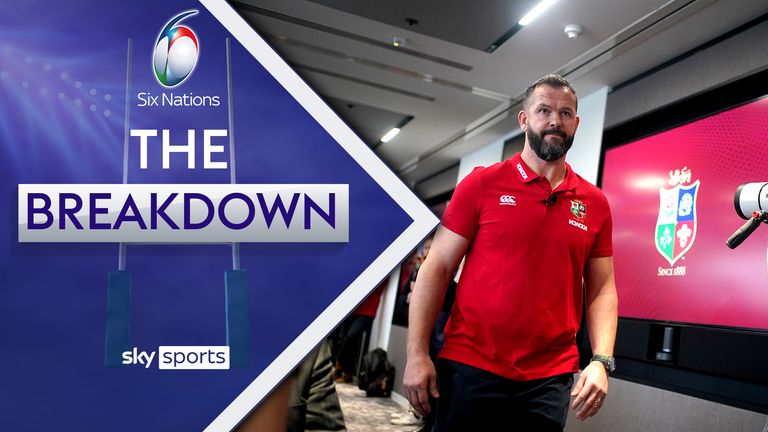
- British and Irish Lions Tour: Everything you need to know
- Andy Farrell: Twickenham loss will be best thing to happen to Ireland
- Warren Gatland offers to resign after Italy condemn Wales to winless Six Nations
- Men's Six Nations: 2024: Full results and fixtures
So, if Lions head coach Andy Farrell was picking his team right now, who would be on the plane to Australia?
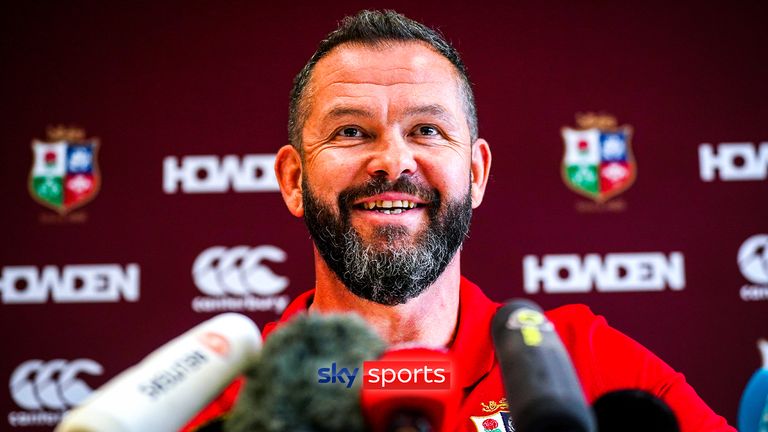
Here are three picks from each nation...
- EFL: Saints & Sunderland lead | Faltering Leicester lose LIVE!
- Alonso commits future to Leverkusen
- Who do Liverpool turn to now?
- Man City vs Arsenal injury watch: Walker & Stones ruled out
- 'Who are you?' - Mystery man bursts out of crowd to challenge Whittaker
- Super League LIVE! St Helens face Wigan in crunch derby
- Chaos as security separates Whittaker from mystery challenger!
- PL build-up LIVE! Klopp speaks as Alonso makes decision on future
- Transfer Centre LIVE! Will Liverpool chase De Zerbi after Alonso blow?
- Papers: Man Utd and Newcastle refusing to budge in Ashworth stand-off
- Latest News
Ellis Genge
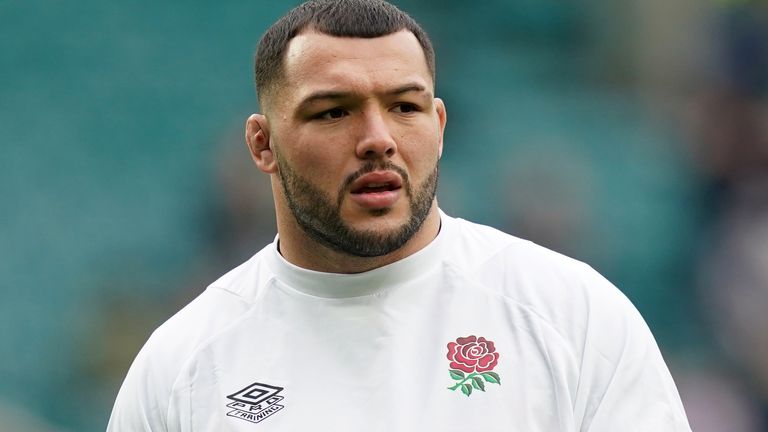
Position: Prop
Sky Sports to show 2025 Lions tour
Lions to play in Ireland for first time in 2025
Gatland backs Farrell to coach Lions
Lions, Premiership, URC announce partnership
Lions Tours: 0
Ellis Genge progressively got better throughout the Six Nations and it culminated in a brilliant scrummaging performance against France's Uini Atonio.
Atonio has six, yes six, stone on Genge but the England man worked hard, got low, and showed what an asset he can be in that front row.
He is also a leader in the England camp and a voice like that will be essential for life on Tour.
Immanuel Feyi-Waboso
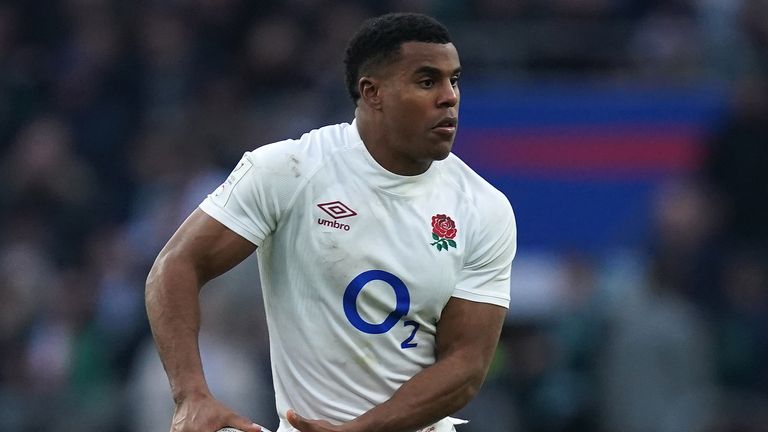
Position: Wing. Centre
Immanuel Feyi-Waboso made quite the impression in the few games he played for England, his start against Ireland cementing him as a real future star.
Ireland could not figure out how to stop his combination of power and pace and if he can continue to grow in the England shirt, he will be a certain name on Farrell's list for 2025.
Ollie Lawrence
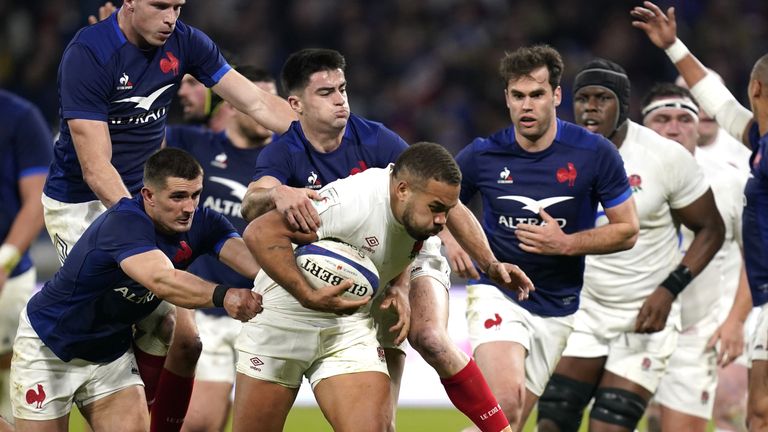
Position: Centre
Another man who had a tournament to remember, when Ollie Lawrence came back into the England side, he showed why he is lethal in that centre position.
He can play any role required - if you need him running hard lines he will, but if you need him using his brute strength to power up the field, he will also do that in abundance.
If he is partnered with a certain Ireland centre, it could be a sensational combination.
Jamie Gibson-Park
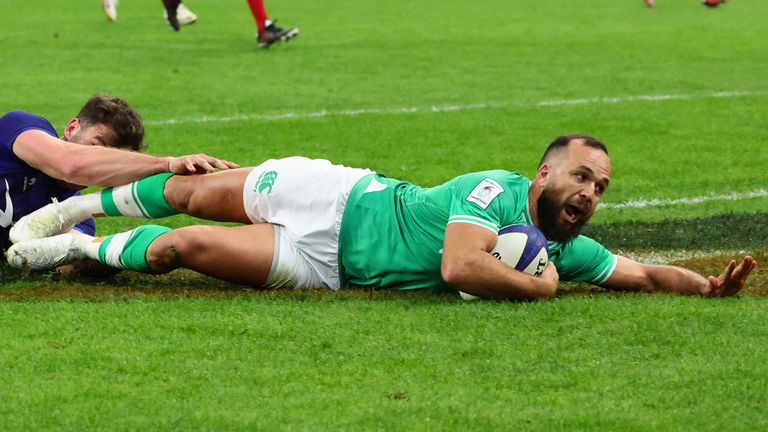
Position: Scrum-half
Ultimately, Jamie Gibson-Park is the best scrum-half out there for the Lions at the moment.
His consistency for Ireland is second to none, and his kicking game and match awareness have been integral to the Ireland system that has seen them dominate so much.
A calm head is always needed in such a vital role and Gibson-Park can fulfil that for Farrell.
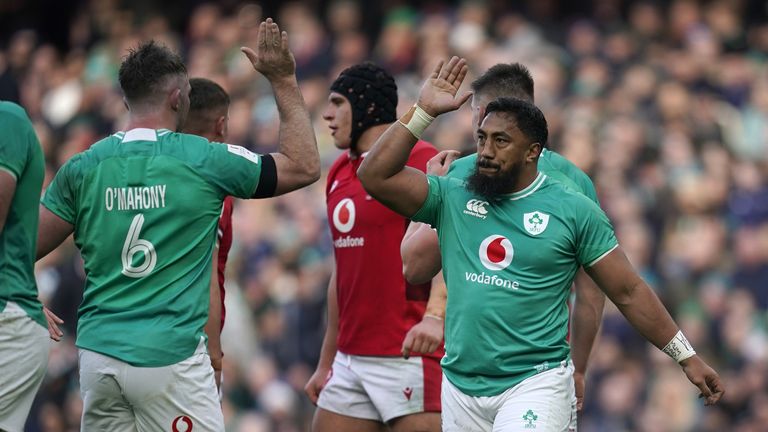
Lions Tours: 1 (2021)
Why wouldn't you put this guy on the plane? His sensational World Cup performance plus his performance at the Six Nations would have Bundee Aki down as a dead cert starter for the Lions at the moment.
His ability to make metres is not matched by any worldwide and he will be a lot for Australia to handle.
It could also be exciting to see him partner someone like Lawrence who also has power and pace.
Jack Crowley
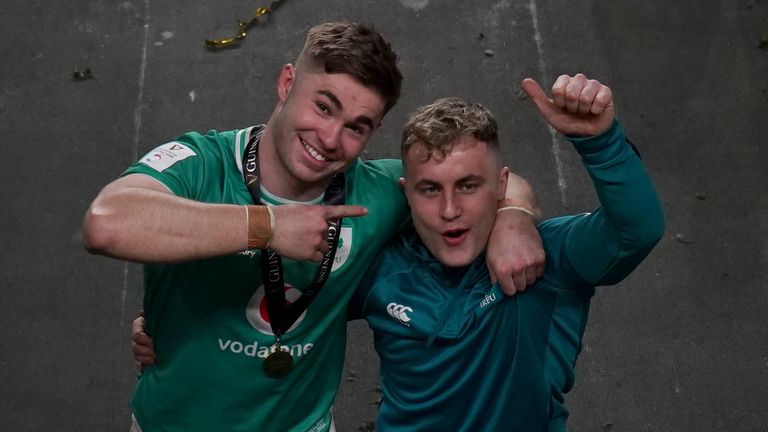
Position: Fly-half
A reward for a seamless transition, Jack Crowley can be a solid fly-half option for the Lions.
He has an old head on young shoulders and is never fazed when he makes a mistake, plus he can kick goals like the best of them.
Not many could step into Johnny Sexton's shoes and perform and he did that brilliantly for Ireland.
Finn Russell
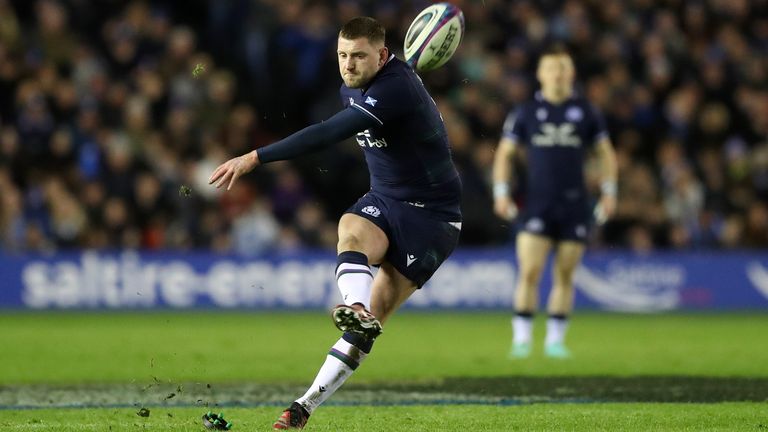
Finn Russell will always bring that flair and you know on a Lions Tour he would enjoy himself creatively on the pitch.
Right now, he is probably the most experienced and in-form fly-half option for the Lions and combined with some other big stars, we could see some Russell flair on show.
He also is a sensational goal kicker and that will be vital for Farrell's side.
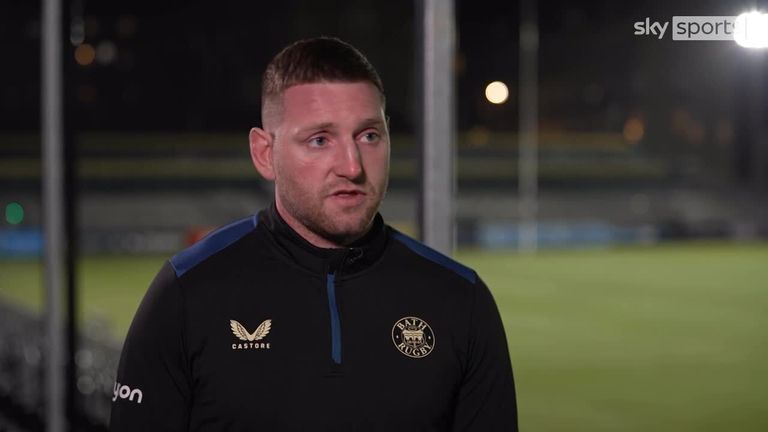
Duhan Van der Merwe
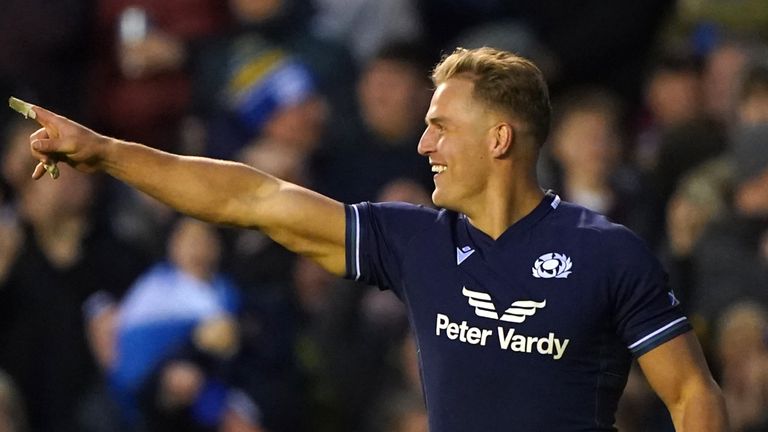
Position: Wing
A man who can create something spectacular all on his own, Duhan Van der Merwe showed why his pace and power on the wing is pretty much unmatched.
There are not many as big as him who can show individual finesse like he does and he already has a solid understanding with Russell that could serve the Lions well in 2025.
Zander Fagerson
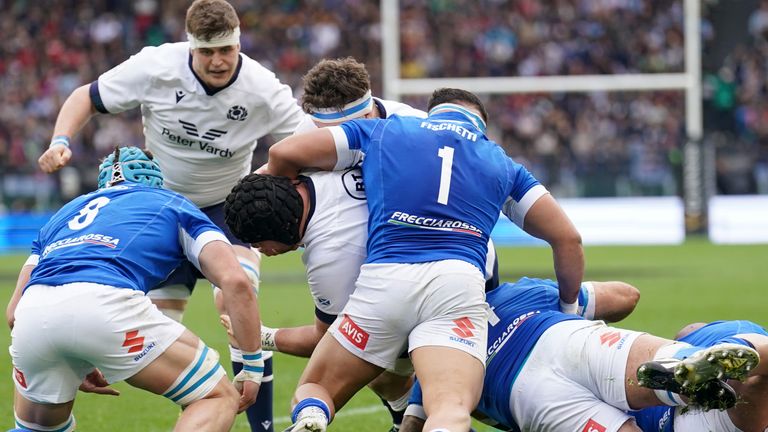
Fagerson is one of the few players in these picks who went on the 2021 Lions Tour. However, he did not play.
The Glasgow Warriors prop has battled against the best of them and could be a solid option off the bench when that front row needs a new breath of life.
Mason Grady
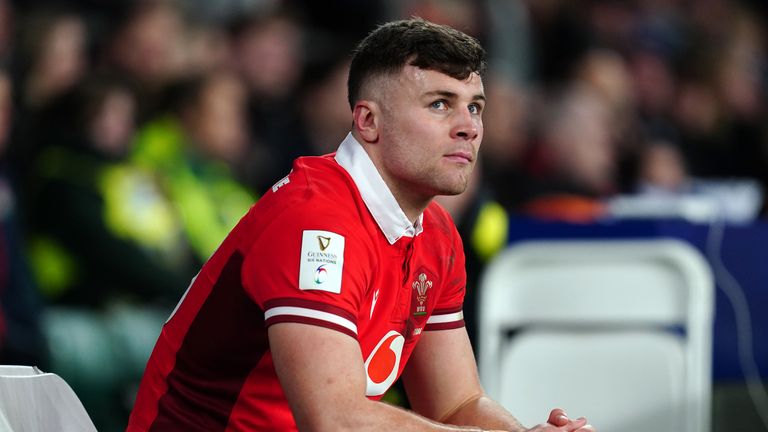
Position: Centre, Wing
Mason Grady didn't get a whole host of minutes across the Six Nations, but when he did grace the field, Grady sparkled.
Scoring in the dying moments of their clash vs Italy, Grady showed that he offers something different with his dazzling footwork and could be someone that Farrell could take on Tour as the Lions look to the future.
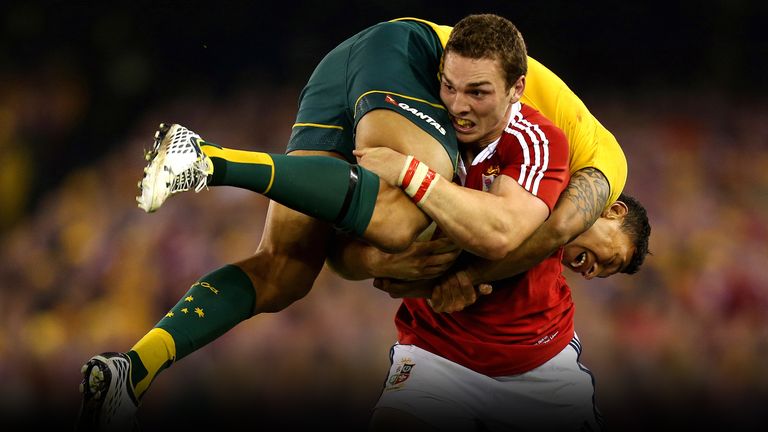
Dafydd Jenkins
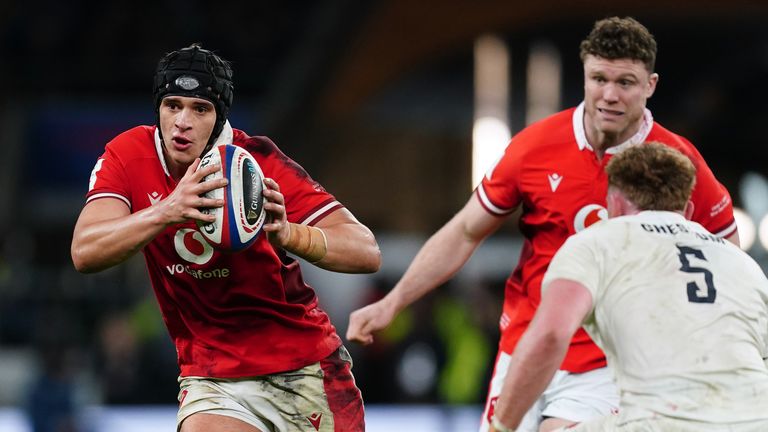
Position: Lock
The one thing a young captain needs is experience and quickly and a Lions Tour could offer the perfect environment for Wales skipper Dafydd Jenkins to grow.
It would be a vital opportunity for him to use his own voice but learn from other huge leaders across the nations as Wales continue their rebuilding journey.
Aaron Wainwright
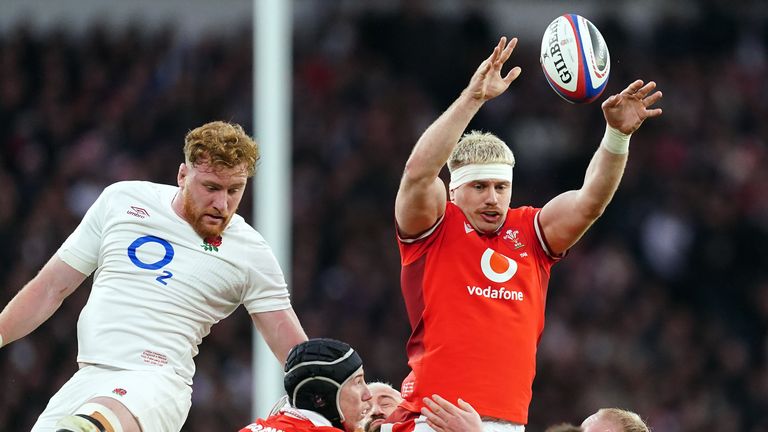
Position: No 8, Flanker
Aaron Wainwright was one of Wales' standout players in the Six Nations, making metres like no other in that Wales jersey.
His energy was electric and his enthusiasm even when under the pump could be a key asset for the Lions.
The fifth nation: The exiles available
Owen farrell.
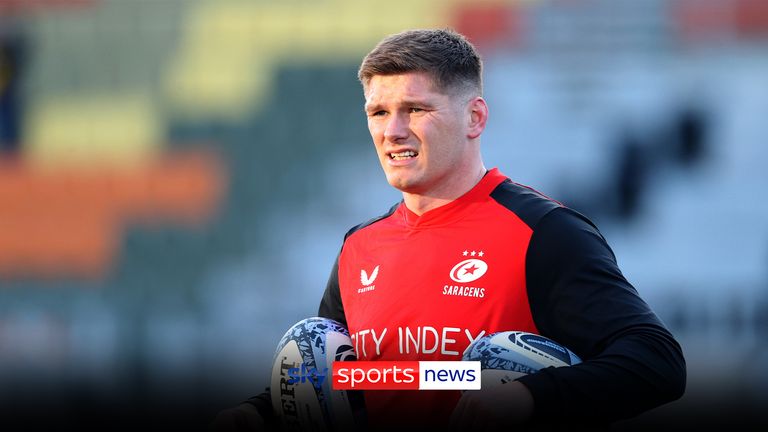
Position: Fly-half, Centre
Lions Tours: 3
Although the former England captain may be out of contention for international selection with his move to Racing 92 imminent, he can very much still be picked for the Lions Tour.
As England's top points scorer ever and with three Tours under his belt, his experience could be invaluable and what a storyline it would be to see father and son in action.
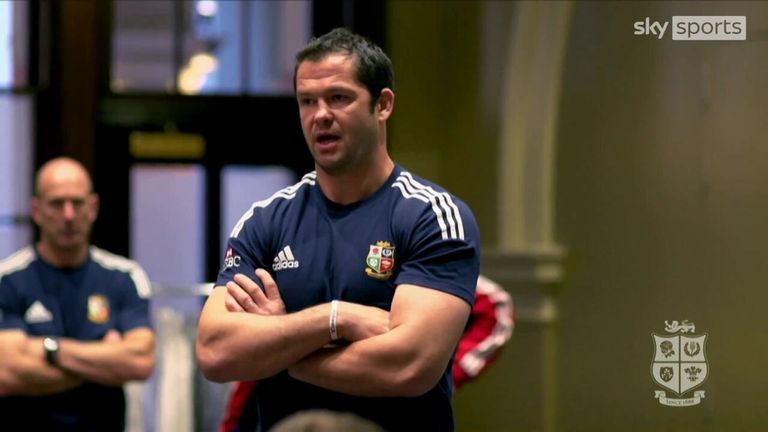
Courtney Lawes
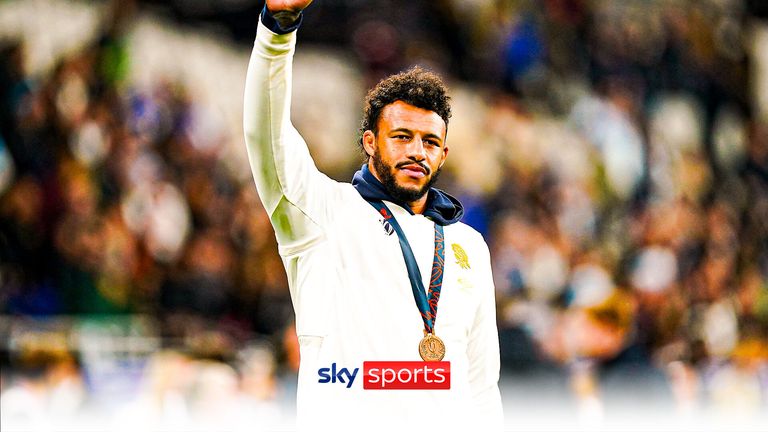
Position: Lock, Flanker
Lions Tours: 2
Lawes retired from international duty after the 2023 Rugby World Cup,but he made sure to make clear that he still sees starring for the Lions in his future.
With a year out in France to come, Lawes could earn himself a shirt and when someone with 105 caps comes knocking, it is hard to turn them down.
Henry Arundell
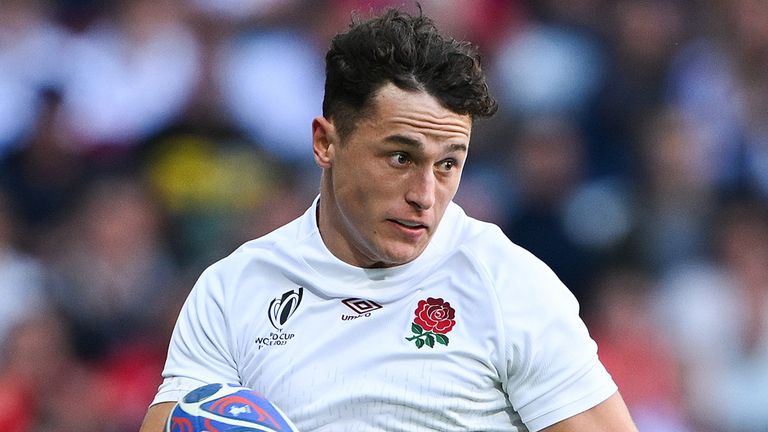
Position: Full-back, wing
Henry Arundell was originally given a special exemption to represent England after London Irish went into administration, but after making his move to Racing 92 permanent, Arundell has locked his door to international duty for now.
However, Arundell has been a constant star and his pace at the back could be huge for the Lions if they come calling.
He knows how to score tries and in a Lions shirt, he could thrive.
British and Irish Lions 2025 tour schedule
Watch every game of the 2025 British and Irish Lions tour of Australia, including all three Test matches against the Wallabies, exclusively live on Sky Sports . Also stream with NOW .
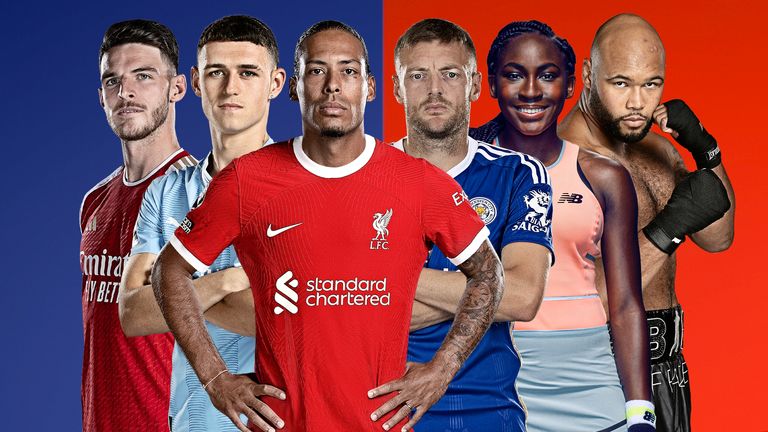
How to watch Premier League, EFL, WSL, boxing, Miami tennis and more
- Stream with NOW

- Upgrade Now

IMAGES
VIDEO
COMMENTS
Against all the odds and amid a pandemic, The British & Irish Lions managed to successfully stage a Tour to South Africa in 2021. 2021 - A Lions Tour like no other. ... But - 22 years after a British side had first set sail for the southern hemisphere - this was the first official Tour, in that it had the sanction of all four home nations. ...
The 1997 British Lions tour to South Africa was a series of matches played by the British Lions rugby union team in South Africa. This tour followed the Lions' 1993 tour to New Zealand and preceded their 2001 tour to Australia.The much-anticipated tour was the first after the end of apartheid in South Africa, and the first Lions tour since rugby union turned professional.
The 2021 British & Irish Lions tour to South Africa was an international rugby union tour that took place in South Africa in July and August 2021. The British & Irish Lions, a team selected from players eligible to represent England, Ireland, Scotland or Wales, played a three-match test series against South Africa, and tour matches against three of South Africa's four United Rugby Championship ...
The 1962 tour to South Africa saw the Lions still win 16 of their 25 games, but did not fare well against the Springboks, losing three of the four tests. For the 1966 tour to Australia and New Zealand John Robins became the first Lions coach, and the trip started off very well for the Lions, who stormed through Australia, winning five non-tests ...
26 May 2021 09:30 Reading Time: 13 mins. David Rollo is flicking through his scrapbook from the 1962 British & Irish Lions Tour of South Africa. The memory may take a little longer to engage these days, but there is no mistaking the warm glow of recollection in the 86-year-old's voice, nearly 60 years after the event.
The Legendary (and Violent) 1974 British & Irish Lions Tour of South Africa. March 25, 2020 12187; ... In rugby terms, however, it was the stage of one of the most controversial sporting series in history; the 1974 Lions tour to South Africa. Under the apartheid regime, South Africa had gradually cultivated a reputation for itself as an ...
That night, after the Lions' 28-9 victory over South Africa in the second Test of 1974, "someone", Bobby remembered, "had set light to a load of empty cardboard beer boxes.
Promotion ends April 12th, 2024. With the British and Irish Lions due to tour South Africa in June of this year, I thought it would be a good time to take a brief look into the history of Lions ...
SUBSCRIBE: http://bit.ly/SkySportsSubRelive the British & Irish Lions 1997 tour of South Africa. The Lions won the first Test of the series with Neil Jenkin...
Monday 21 June 2021, 5:59pm. The Lions will head to South Africa for a six week tour, including three test matches against the Springboks Credit: PA. The British & Irish Lions are currently in ...
Total Rugby recently took a look back at what happened on the last successful Lions tour, which was 15 years ago in South Africa. As with the 2009 tour, The British & Irish Lions of 1997 travelled to South Africa to take on the World Champions in their own backyard. The series will always be remembered for that moment of brilliance from Jeremy ...
In 1974, the British & Irish Lions toured South Africa, with matches in South West Africa and Rhodesia. Under the leadership of Willie John McBride, the Lions went through the tour undefeated, winning 21 of their 22 matches and being held to a draw in the final match, albeit in controversial circumstances. The 1974 squad became known as 'The ...
Pens: Biggar 3 7 August - Third Test: South Africa 19-16 Lions Try: Owens Pens: Russell 3 Con: Russell All matches at Cape Town Stadium. Tour results. 26 June - Lions 28-10 Japan (Murrayfield ...
A Series victory against the Springboks. Here are our top tries from the 1997 British & Irish Lions Tour to South Africa.#Lions #LionsRugby #BritishAndIrishL...
The Lions won the first two series between the two sides in 1891 and 1896, including wins in the first six matches, but then did not win another series until their unbeaten 1974 tour. After South Africa's victory in the 1980 series , the two teams did not meet again until 1997 as a result of apartheid sanctions; the Lions won the 1997 series ...
In September 1903, The British & Irish Lions came head-to-head with South Africa in a hugely tense second Test in Kimberley.. As a gruelling 1903 Tour spanning over two months was coming to an end, the Lions (who had not officially been given that title), on only their fifth Tour and third in South Africa, were locked in an even Test series. The Tour began in July, where a squad of 21 Lions ...
Full time: South Africa 19-16 Lions The scrum folds, it's a South Africa penalty, and Steyn just needs to kick it into touch. That feels like a fitting end. That feels like a fitting end. Bravo ...
The 1938 British Isles tour to South Africa was the fourteenth tour by a British Isles team and the sixth to South Africa. The tour is retrospectively classed as one of the British Lions tours, as the Lions naming convention was not adopted until 1950. The tour party was led by Ireland's Sam Walker and managed by Col. Hartley, and took in 24 matches. Of the 24 games, 19 were against club or ...
Louis Rees-Zammit has already had an incredible rugby career despite being 23 years old and embarks on a new challenge as he chases his NFL dream. ... for the 2021 British and Irish Lions tour to ...
We take a closer look at which stars from the 2024 Six Nations could be on the plane to Australia for the Lions; Watch every game of 2025 British and Irish Lions tour of Australia, including all ...
The 1891 British Isles tour to South Africa was the first British Isles rugby union tour of South Africa and only the second overseas tour conducted by a joint British team. Between 9 July and 7 September, the team played 20 games, including three Tests against the South Africa national rugby union team.The British Isles not only won all three Test matches, but also won all 17 provincial games.
The 1910 British Isles tour to South Africa was the eighth tour by a British Isles rugby union team and the fourth to South Africa. It is retrospectively classed as one of the British Lions tours, as the Lions naming convention was not adopted until 1950. As well as South Africa, the tour included a game in Bulawayo in Rhodesia, now Zimbabwe .